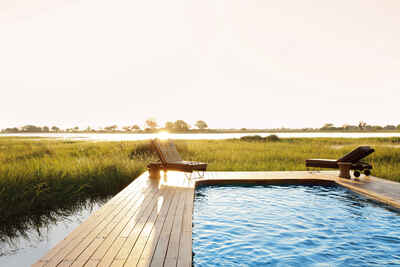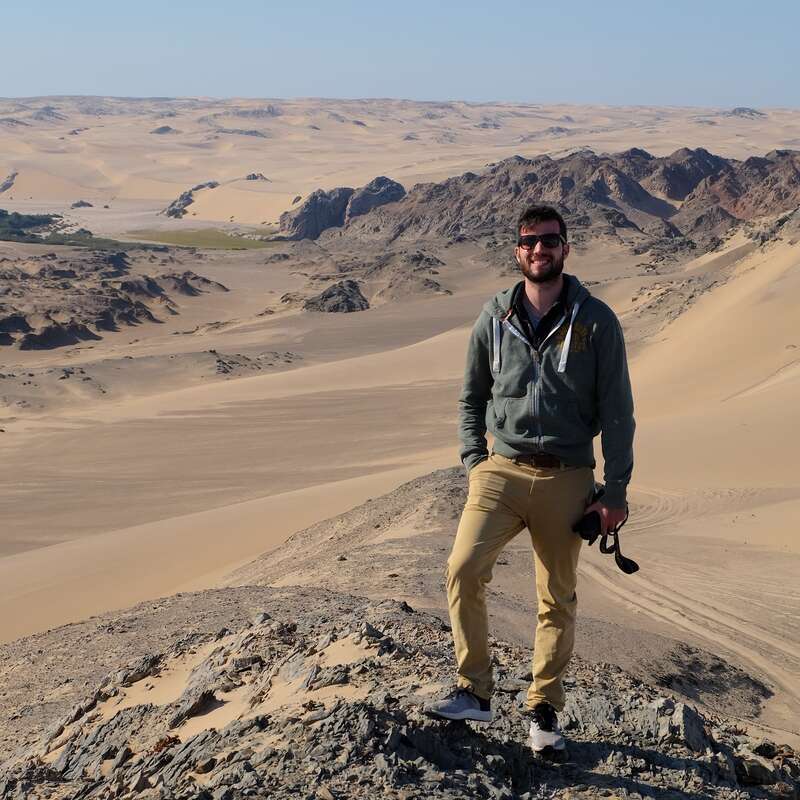About Mapula Lodge
The long jetty that leads out from Mapula Lodge might hint at the Caribbean, but hippos inhabit this lagoon.
Herbivores of all sizes graze on the surrounding plains, while big cats and wild dogs watch from the wings – and the birdlife is prolific.
Stay alert, and you could spot much of the wildlife from camp, be it from your four-poster bed, ensconced among the trees on your private veranda, or perhaps cooling off in the pool.
Stretch your safari horizons on a game drive, and you’ll reach beyond the so-called “buffalo fence”, to encompass a diverse range of eco-systems. In season, explore the channels by motorboat, or get closer still in a mokoro.
Back at camp it’s a haven of cosiness, the extensive wooden decking gleaming almost shipshape in the sunshine. Flashes of red in rugs, sofas and lighting punctuate the natural background of thatched roofs and reed walls, and locally woven baskets hangs from the ceiling. Even the exposed copper pipes in the en-suite bathrooms add warmth.
As night falls, a cosy boma comes into its own, drawing guests to share a drink around the fire before settling down for a convivial dinner – the perfect opportunity to mull over the day’s adventures.
Our view
Mapula is an old favourite of ours. Don't expect five-star luxury, though for travellers seeking a good-value Botswana safari in an area of plentiful game area with good guiding, Mapula has made a sound choice over the years. Standards did slip for a while but on our two most recent visits we witnessed some promising changes. However, following another change in management we are currently not recommending the lodge because there are too many unknowns. Please speak to us for alternative suggestions.
Accommodation
Nine chalets
Children
Best for 12+
Open
All year
Activities

4WD Safari

Birdwatching

Boat trip

Fishing

Guided walking safari

Helicopter

Mokoro

Night drive

Private activities
Traveller reviews of Mapula Lodge
20 real, un-edited reviews from Expert Africa's travellers.
Arrived 14 May 2022, 3 nights
"Mapula Lodge review"
Overall rating: Excellent
Arrived 23 Jun 2019, 3 nights
"Magnificent Mapula"
Overall rating: Excellent
Arrived 2 May 2019, 3 nights
"Absolutely fantastic! Staff were incredible"
Overall rating: Excellent
Arrived 10 Nov 2011, 3 nights
"Mapula Lodge review"
Overall rating: Good
Arrived 4 Oct 2011, 2 nights
"a good informal lodge in a traditional style"
Overall rating: Good
Arrived 22 Jul 2011, 2 nights
"Mapula Lodge review"
Overall rating: Good
Arrived 24 May 2011, 3 nights
"Great Safari at Mapula Lodge"
Overall rating: Good
Arrived 20 May 2011, 4 nights
"Wonderful Stay at Mapula Lodge"
Overall rating: Excellent
Arrived 21 Apr 2011, 3 nights
"Mapula Lodge review"
Overall rating: Excellent
Arrived 19 Mar 2011, 3 nights
"Mapula Lodge review"
Overall rating: Good
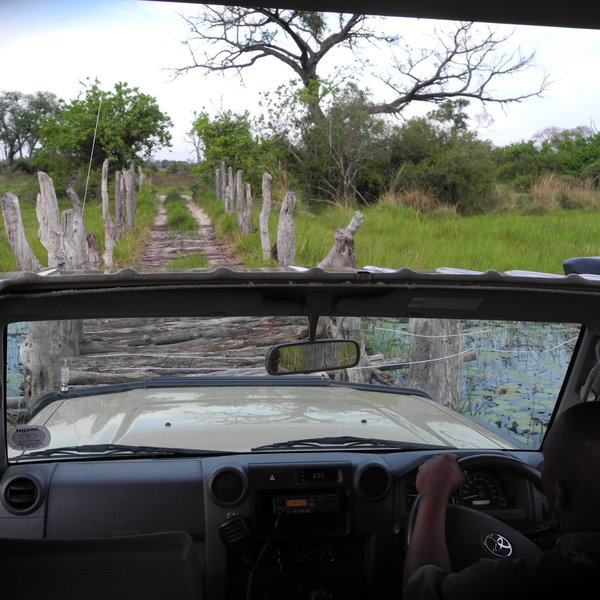
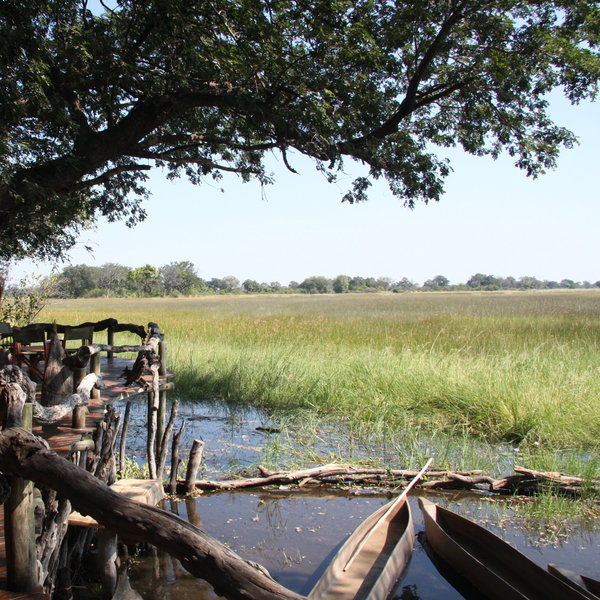
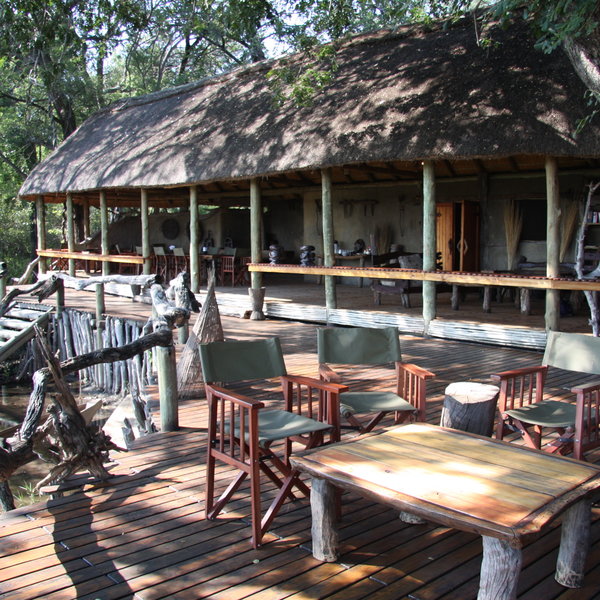
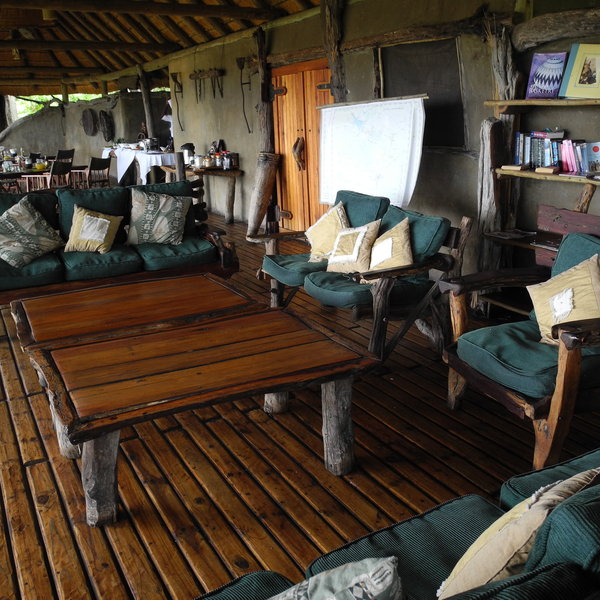
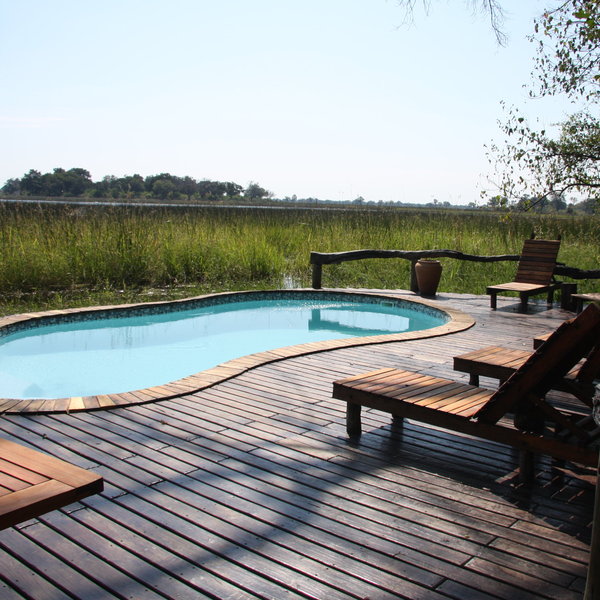
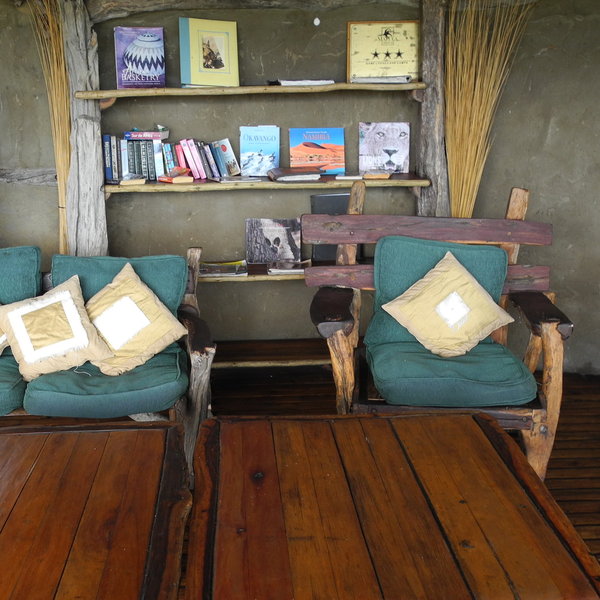
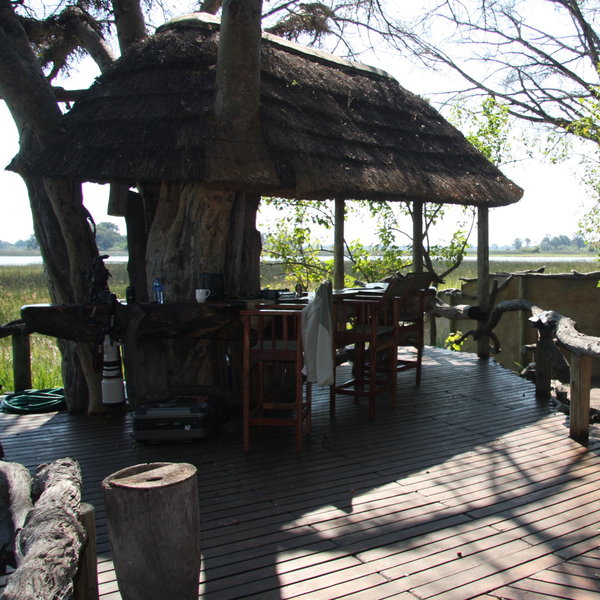
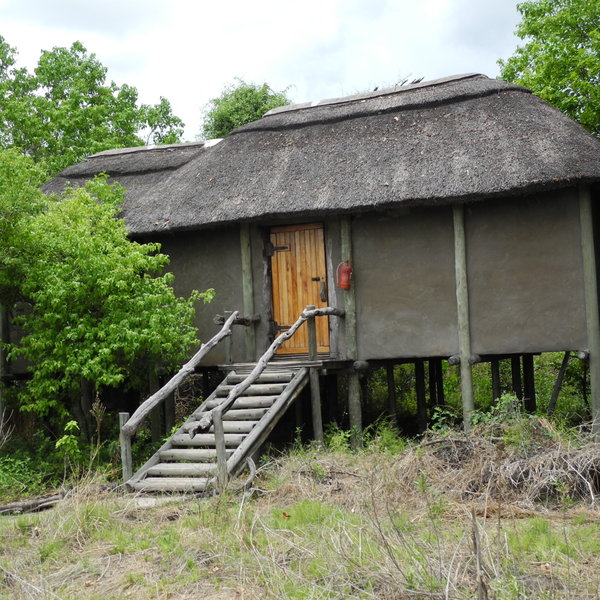
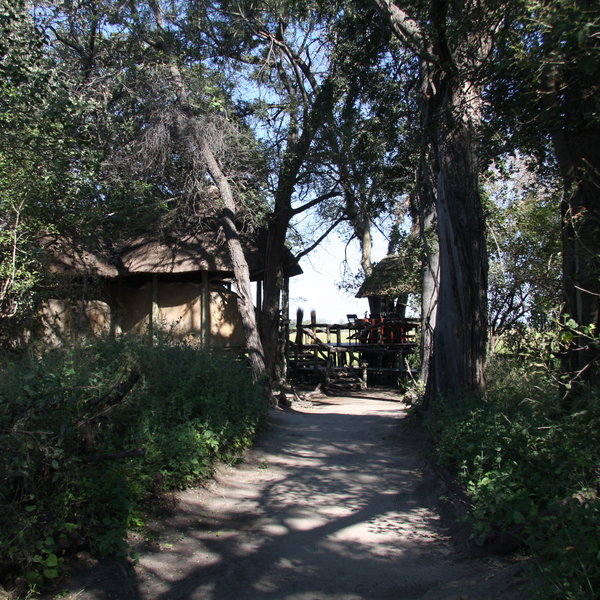
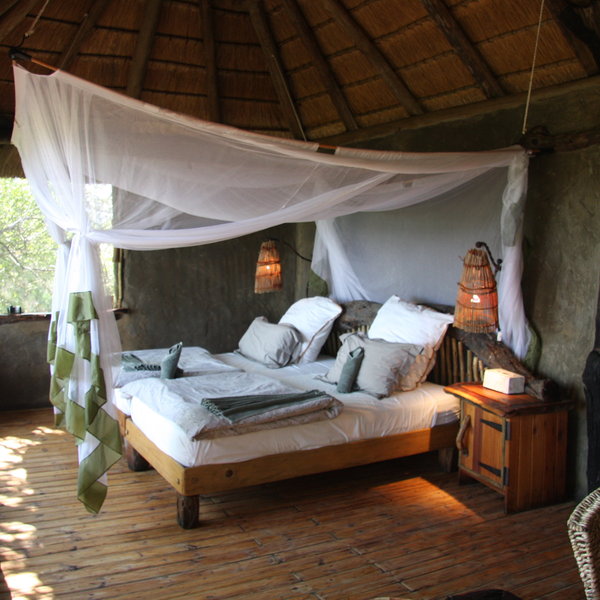
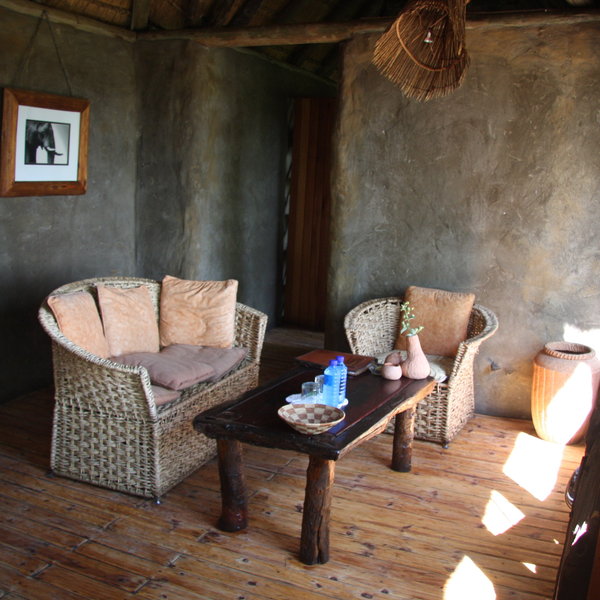
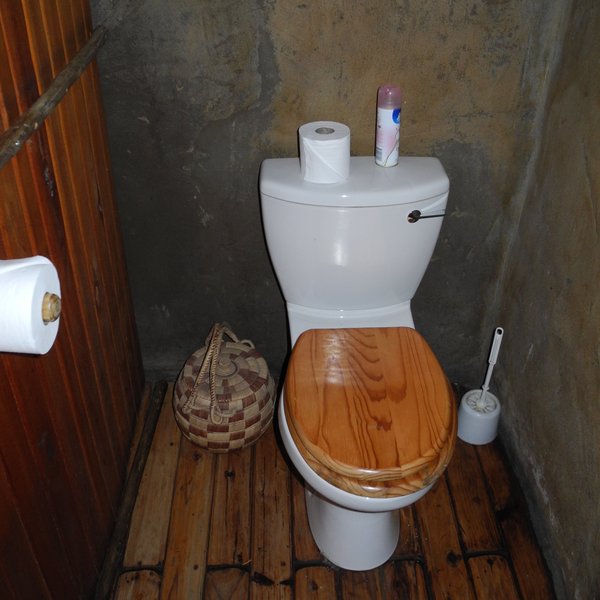
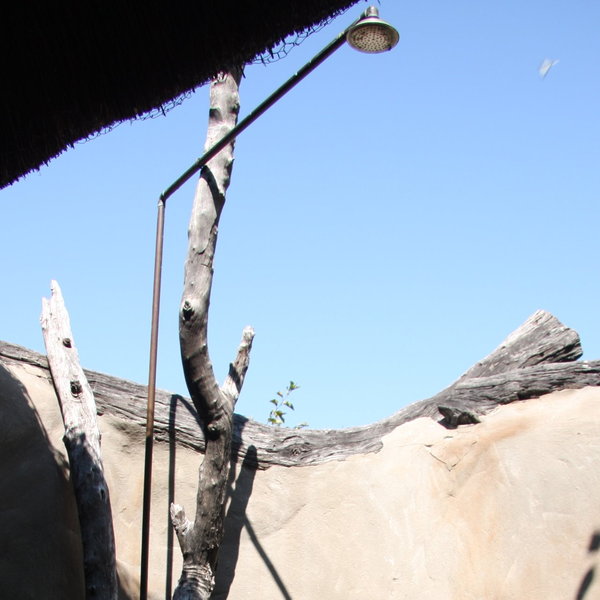
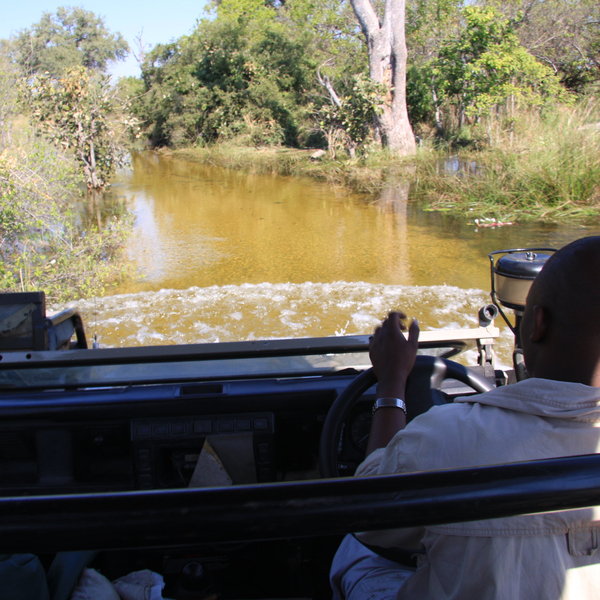
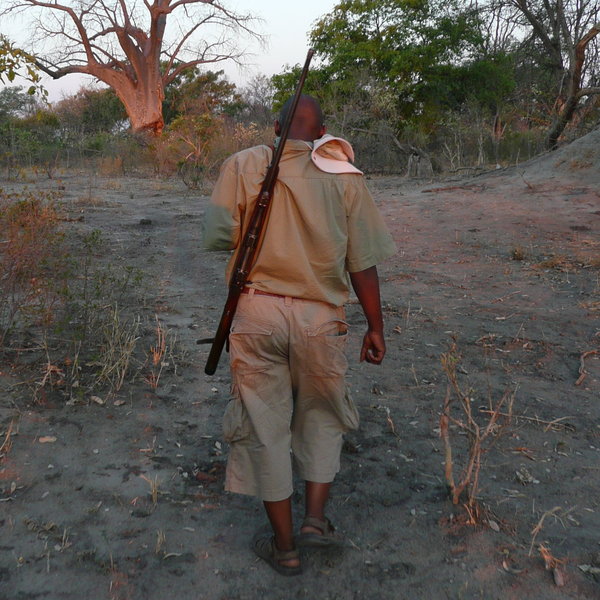
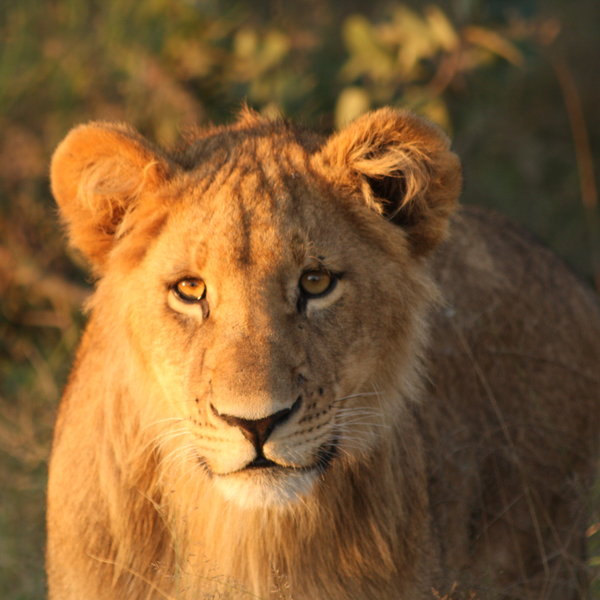
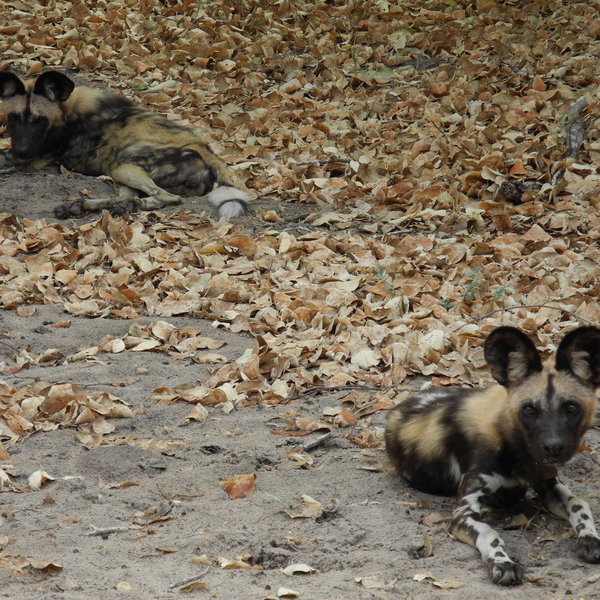
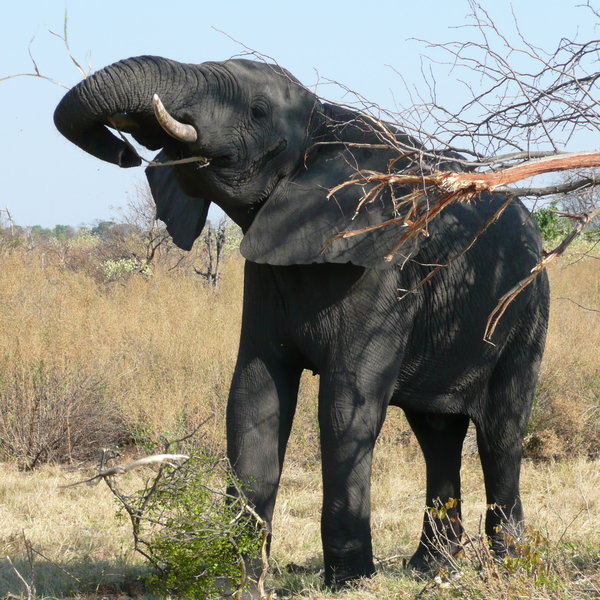
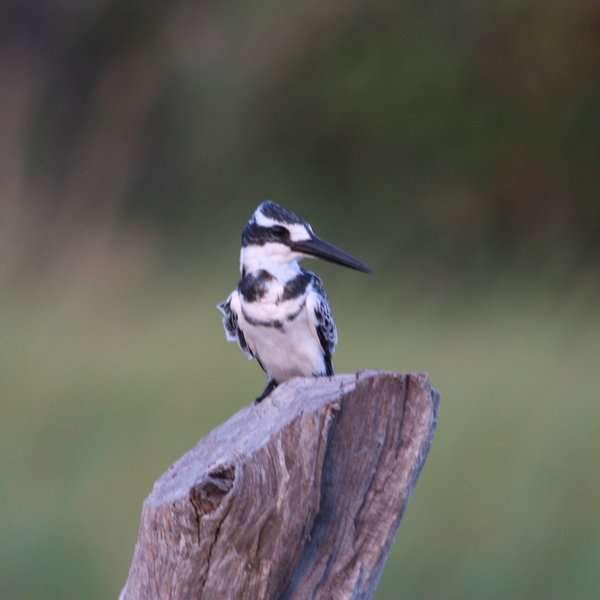
Expert Africa's gallery
When we travel we take lots of photos ourselves to give you a real and un-edited view of the safaris. See our 38 pictures of Mapula Lodge to get the candid view.
View galleryMapula Lodge: Our full report
Mapula Lodge occupies a stunning position in a game-rich, private concession, or reserve, within the northern ...
... Okavango Delta. Set on a large tree island at the edge of seasonal floodplains, it overlooks a permanent lagoon complete with resident hippos and varied birdlife. At the beginning 2023 the management of Mapula Lodge changed again, the third such change in four years or so. Following this, we are currently not booking Mapula until we have had a chance to visit and understand the latest iteration better.
The lodge lies in the NG12 concession, slightly north of the renowned Vumbura and Duba Plains reserves, in an environment that's fairly similar to that found at Vumbura. The wildlife in this region is varied and there can be excellent sightings of big cats, wild dogs and large herbivores.
Mapula shares the reserve with two other camps (neither of which we feature), so guests do occasionally come into contact with their game vehicles when out on drives.
The camp’s nine canvas-and-thatch chalets are fairly well spaced along sandy pathways. They are built about six steps up on raised platforms among some lovely old trees, in harmony with their surroundings, and maximising the views over the lagoon. When the chalets are rebuilt, which is planned for 2020, the aim is to enlarge them and space them out even further.
The current rooms have large, almost floor-to-ceiling mesh windows, with an extra window at the back to allow a through breeze and better ventilation. The floors are constructed from old wooden beams, which extend to each chalet's private sheltered balcony.
Inside you'll find twin or double wrought-iron four-poster beds with overhead fans and mosquito nets, their fabric canopies giving a slightly ornate feel. Either side of the beds are bedside cabinets with good reading lights; the switches are accessible from inside your mosquito net, which is handy!
The small living area has a wicker sofa scattered with cushions, a wooden trunk with a tray and flask of ice water, a small coffee table and a chest of drawers with a charging point for international plugs.
The en-suite bathroom is behind a curtain, allowing a little privacy. Dark-wood clads the walls at the back, with shelving and hanging space, and ample lighting. Here you'll find dressing gowns, towels, sarongs, insect repellent in a little wooden box, and complimentary toiletries. Twin basins with copper taps sit beneath a large mesh window, and there are two showers: one inside with exposed copper piping and a large copper showerhead; the second through a solid wooden door on a separate small deck. Everything is compact, neat and tidy.
The traditional thatched main area of Mapula Lodge features reed-and-stick walls at the back, and a completely open front to make the most of the views. The open-plan layout incorporates a comfortable dining room and lounge, whose focal point is an antique dresser that serves as a drinks cabinet. Two small seating areas are furnished with simple, if slightly dated, couches in bright fabrics, and decorated with wooden carvings, brass ornaments, grass baskets and woven chandeliers. A wooden table with canvas directors' chairs runs the full length of the dining area, while tucked away is a rather uninspiring tea and coffee station – though afternoon tea is set up outside in a far more attractive setting.
On the large deck, you can sit in the shade of an ancient African ebony, while a walkway leads out from the deck to a jetty, which comes into its own when water levels rise. There is also a boma (a firepit surrounded by more directors' chairs), where we enjoyed a nightcap, watching the fruit bats flying to and from the sycamore tree.
Off to the side on a separate deck is a swimming pool with sunloungers and a shady sala – along with a few yoga mats, skipping ropes, weights and an exercise ball.
Activities at Mapula focus on day and night game drives and guided walks. If you're particularly keen on walking, we recommend that you let us know in advance so we can make sure the camp has a trained walking guide available. Water levels permitting (usually around end April to mid-October), Mapula offers mokoro (dug-out canoe) and motorboat excursions from its own jetty, but on our last two visits – in March and November 2019 – these were not possible.
The Okavango's main “buffalo fence” runs through part of the Mapula reserve. Although this can detract from the aesthetics of some views, the game largely ignores it, easily passing from one side to the other through its many gaps. Game drives operate on both sides of the fence, and the range which these can cover varies depending on flood levels. Due to the different eco-systems, wildlife on both sides is plentiful and varied, and the birding is excellent.
Activities
4WD Safari
Birdwatching
Boat trip
Fishing
Guided walking safari
Helicopter
Mokoro
Night drive
Private activities
Families & children
- Attitude towards children
- Mapula welcomes children aged six years and above.
- Property’s age restrictions
- Private game-drive vehicles must be booked, at an additional cost, for families with children under 12 years. Although children under 12 may join mokoro excursions at the manager's discretion, we wouldn't recommend this. Only children aged 16 years and over may join walking safaris, but for younger children, shorter walks in the vicinity of the lodge may be arranged with the manager.
- Special activities & services
- Aside from shorter walks in the vicinity of the lodge there are no special activities for children.
- Equipment
- No special equipment is available.
- Generally recommended for children
- Recommended for older children only, who – given the obvious and constant danager posed by big game here – must be very sensible.
- Notes
- Mapula Lodge is very open with dangerous wildlife walking through the camp, so children will need constant and close supervision by a parent or other adult.
Food & drink
- Usual board basis
- Full Board & Activities
- Food quality
- On past visits we have found the food at Mapula variable, but on our most recent two visits in 2019 the food was very good. With advance warning most dietary requirements can be accommodated.
Our early-morning breakfast before the day's first activity was a full continental buffet of cereals, pastries, yoghurt and fruit. A cooked breakfast was on offer too, along with coffee and tea.
An early lunch, generally plated, is served after your morning safari activity. On our most recent visit, in November 2019, we enjoyed battered hake served with a fresh green salad and steam vegetables. This was followed by a platter of cheese with biscuits and fresh fruit.
Afternoon tea before your second activity usually includes a savoury snack and something sweet, along with iced tea, homemade lemonade, tea and coffee. We had assorted sandwiches, pizza slices and a freshly baked carrot cake.
Dinner is a full three-course plated meal. Our starter was a spicy carrot soup, which was followed by a juicy rump steak served with creamy mash, gravy and steamed vegetables. For dessert we had a fresh lemon tart. - Dining style
- Group Meals
- Dining locations
- Indoor and Outdoor Dining
- Drinks included
- Soft drinks, bottled water, spirits, local beers and a selection of (generally) South African wines are included. Imported wines and spirits and champagne cost extra – and need to be requested in advance.
The camp has a filtration process to purify borehole water for drinking. Fresh bottled water is also available.
Our travellers’ wildlife sightings from Mapula Lodge
Since mid-2018, many of our travellers who stayed at Mapula Lodge have kindly recorded their wildlife sightings and shared them with us. The results are below. Click an animal to see more, and here to see more on our methodology.

100% success

100% success

100% success

100% success

100% success

100% success

80% success

80% success

40% success

40% success

25% success

20% success

0% success

0% success

0% success

0% success

0% success
Getting there
- Location
- Okavango Delta Safari Reserves, Botswana
- Ideal length of stay
- We’d recommend a stay of two or three nights at Mapula Lodge.
- Directions
- Mapula Lodge is approximately 40 minutes by light aircraft from Maun, followed by a game drive of about 30 minutes, depending on water levels and the wildlife you see on the way. When the water is high (usually from around end April to mid-October) you are more likely to boat into camp after a short ten-minute drive from the airstrip.
- Accessible by
- Fly-and-Transfer
Special interests
- Birdwatching safaris
- Having a variety of habitats on its doorstep Mapula Lodge is a superb camp for birding. Over the years, we have spotted dwarf bittern, wattled crane, saddle-billed stork, brown snake eagle, Meyer's parrot and lesser grey shrike.
- See ideas for Birdwatching safaris in Botswana
- Wildlife safaris
- As part of a wildlife safari in Botswana, Mapula Lodge offers plenty of plains game, including zebra, buffalo, lechwe and giraffe, as well as elephant, and predators such as lion, leopard and wild dogs.
- See ideas for Wildlife safaris in Botswana
Communications
- Power supply notes
- There is a back-up generator.
- Communications
- For most purposes, consider yourself out of contact here. There is no cellphone reception and no email. Satellite phone contact can be made with Maun in an emergency.
- TV & radio
- No radio or television!
- Water supply
- Borehole
Health & safety
- Malarial protection recommended
- Yes
- Medical care
- There is a first-aid kit kept at camp. The nearest doctor is in Maun, a 40-minute flight away. Please note that it is only possible to fly out of camp during daylight hours as the bush airstrips do not have any lighting at night.
- Dangerous animals
- High Risk
- Security measures
- Because of the Okavango Delta's large population of dangerous game, and the fact that Mapula Lodge is unfenced, guests are escorted to their rooms after dark.
- Fire safety
- You will find fire extinguishers in all the rooms.
Useful info
- Disabled access
- On Request
- Laundry facilities
- A laundry service is included but for cultural reasons, this excludes underwear. Washing power is provided in your chalet for you to handwash these items.
- Money
- No exchange facilities are offered.
- Accepted payment on location
- Mastercard and Visa credit cards are accepted, but Diners and Amex are not. Cash can only be accepted for tipping.
Plan and book your trip with Expert Africa
All of our trips are tailor-made, so we'll always adapt them to suit you. Talk to an Expert and let us plan and arrange your perfect trip.

Talk to an Expert
Call or email us now! We’ll match you with the Specialist in our team who is best suited to help you. Then together we can start planning your trip.

Set up your itinerary
Based on our experience and your ideas, your specialist will create a detailed, costed itinerary. We’ll refine it together, until we have a trip that you’re perfectly happy with.

Prepare for your trip
The same Specialist will make the seamless arrangements for your trip, send you detailed travel documents, and be available to answer any questions before you depart.

Travel with peace of mind
After you set off, you’ll be cared for by our partners in Africa, most of whom have worked with Expert Africa for decades. And if you ever need us urgently, we’re available 24/7.

When you return
We love to learn about your trip, and so will always be grateful if you’ve the time to give feedback to your Specialist when you return.
Mapula Lodge's location
Look closer at the environment and surroundings of Mapula Lodge.
Excursions from Mapula Lodge
Optional extra day-trips and excursions possible whilst you're staying at Mapula Lodge. Talk to us: these are usually best arranged before you go.
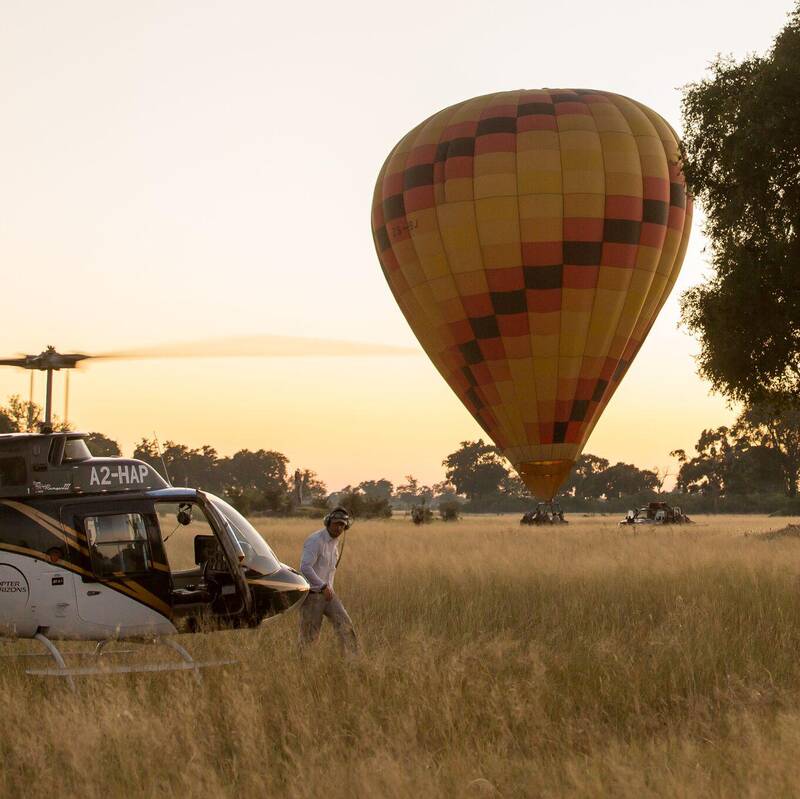
Ballooning in the Okavango Delta
Half day - mornings only
Airborne over the Okavango Delta is always magical - not only for its beauty, but also for insights it gives you into the patterns of channels, lagoons and floodplains. Floating silently at dawn, watching the early sun light up the misty palms islands and spotting the animals as they wake up is particularly enchanting.
More about Okavango Ballooning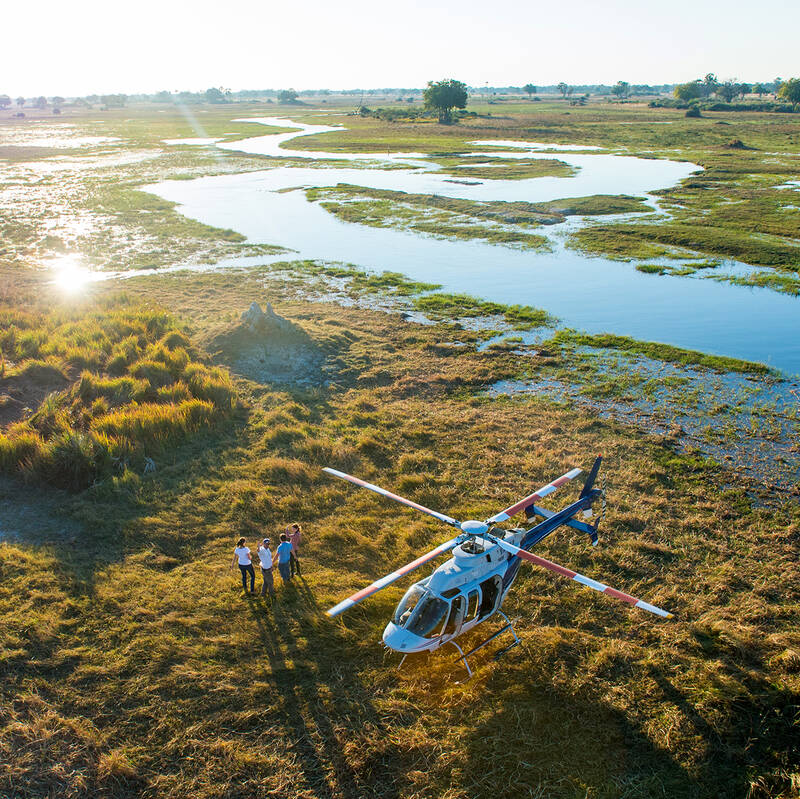
Helicopter Flight - Botswana
Various: from 30 minutes to half a day.
Low-flying, agile and offering superb views, helicopters are an ideal way to move around the Okavango Delta.You can use them instead of fixed-wing inter-lodge transfers or as an addition to other wildlife watching activities, and of course, helicopters can hover to allow that perfect pic, whereas fixed-wings can’t.
More about Helicopter FlightOther lodges in Okavango Delta Safari Reserves
Alternative places to stay in this same area.
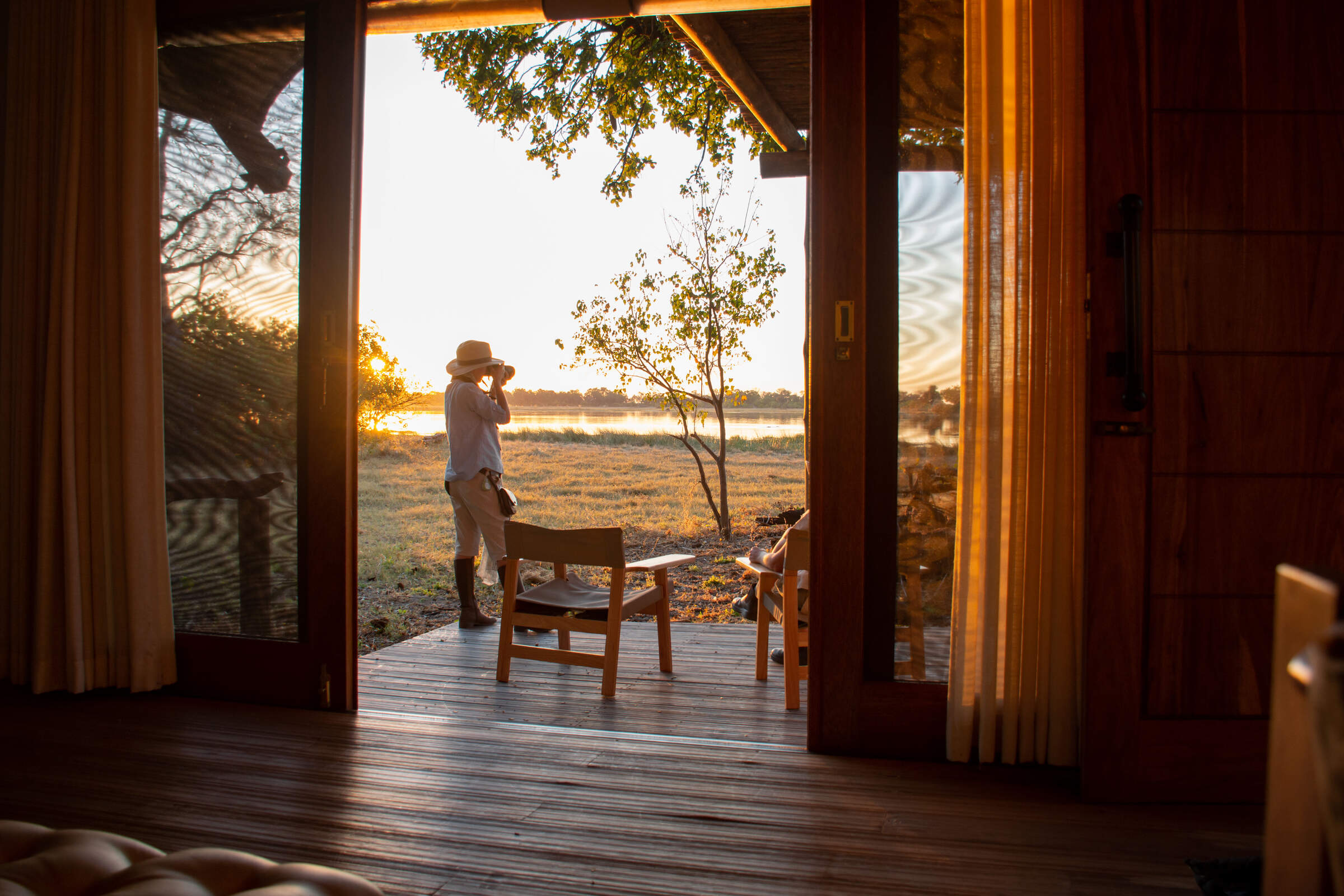
Kwara Camp
Kwara Camp's private reserve boasts land and water activities year-round, with excellent game-viewing opportunities and access to permanent channels of the north-east Okavango Delta.
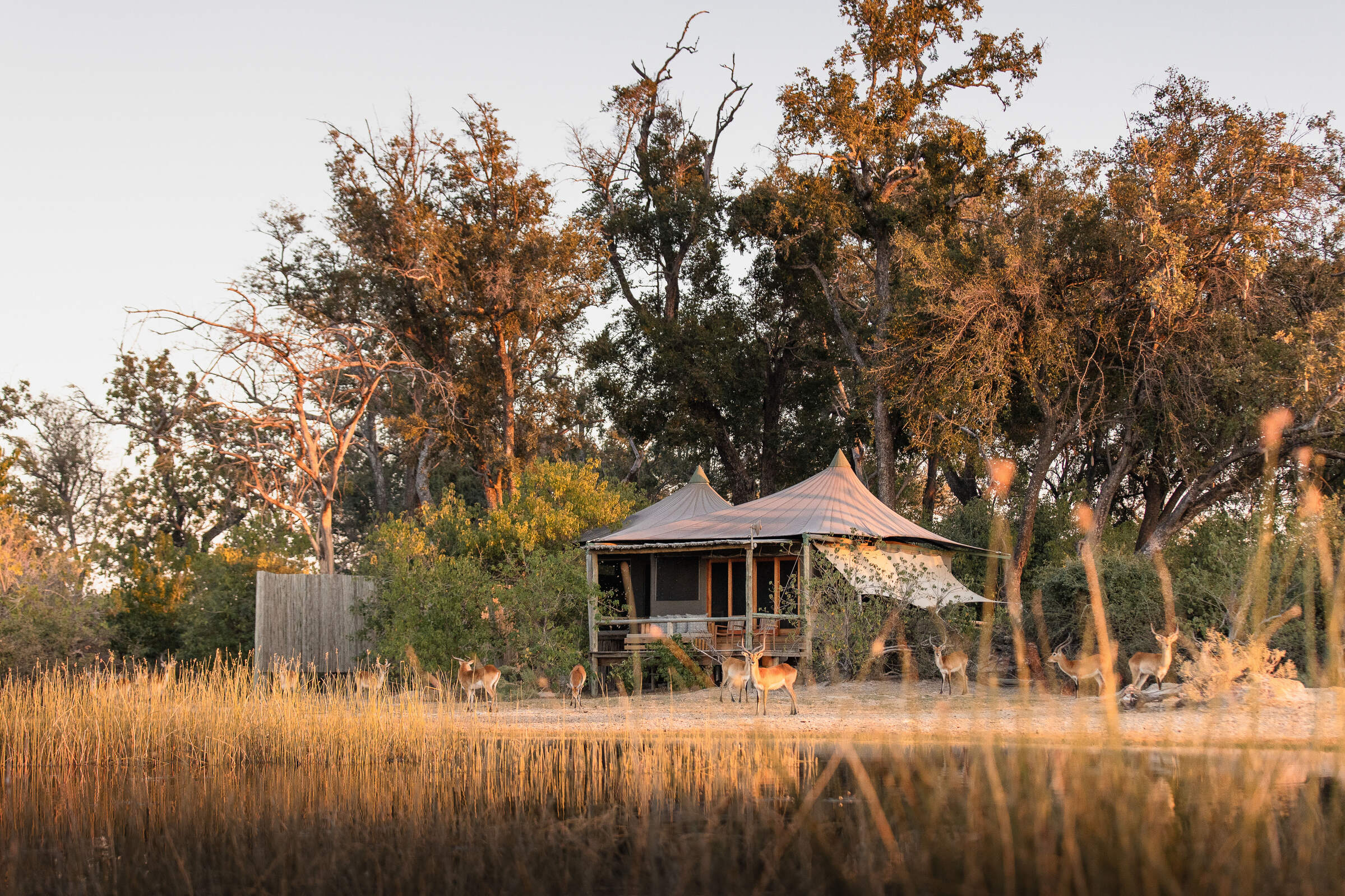
Little Vumbura
On a secluded island within a private reserve, Little Vumbura combines superb game viewing with a broad diversity of habitats in a truly picturesque setting.
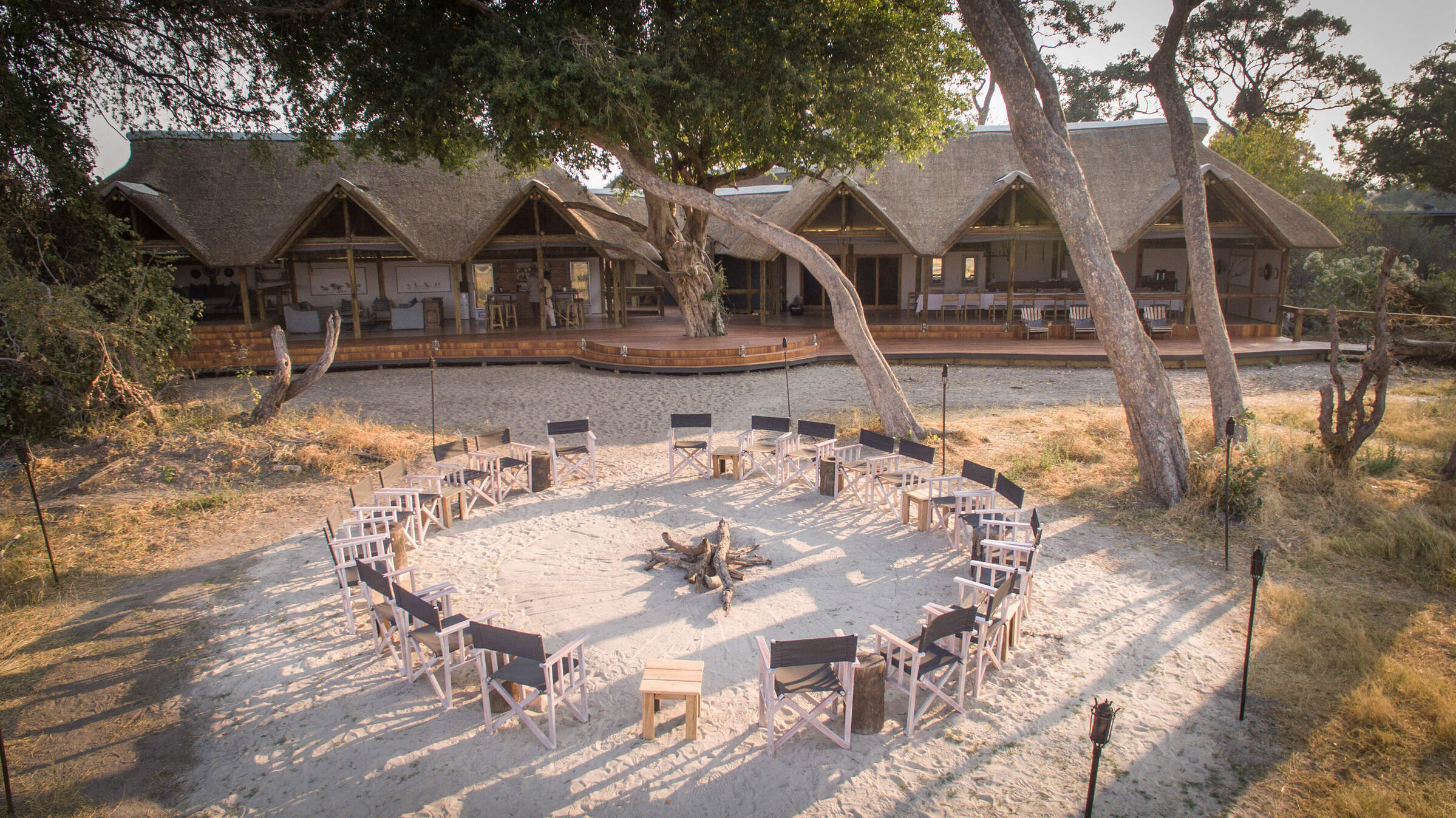
Splash Camp
Set in the Kwara Reserve, offering superb wildlife viewing year-round, Splash offers both land and water activities led by guides with a particular knack for tracking big game.
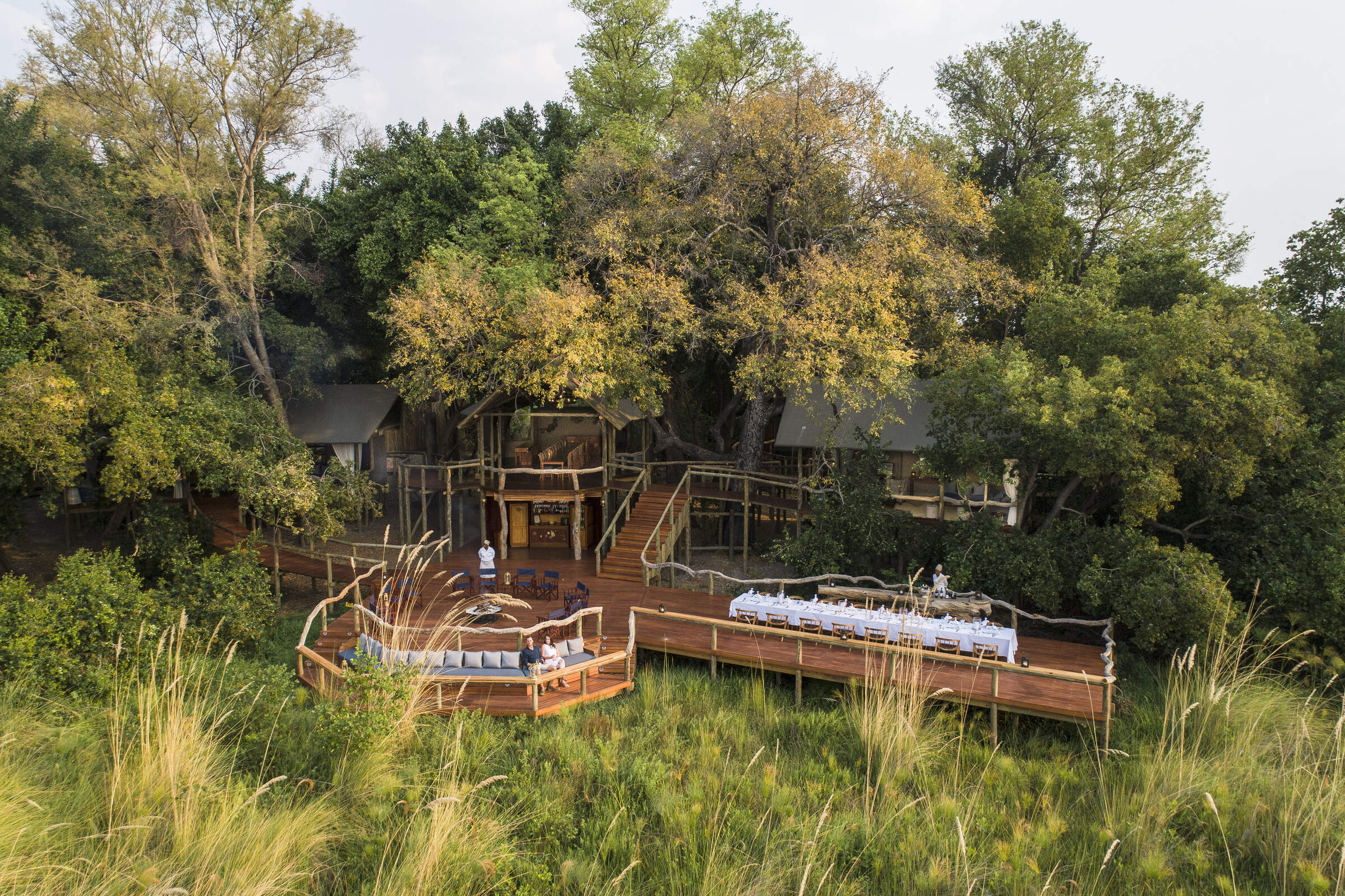
Shinde Camp
With experienced staff and a wealth of activities, Shinde offers a traditional safari in an exceptionally varied and wildlife-rich environment.
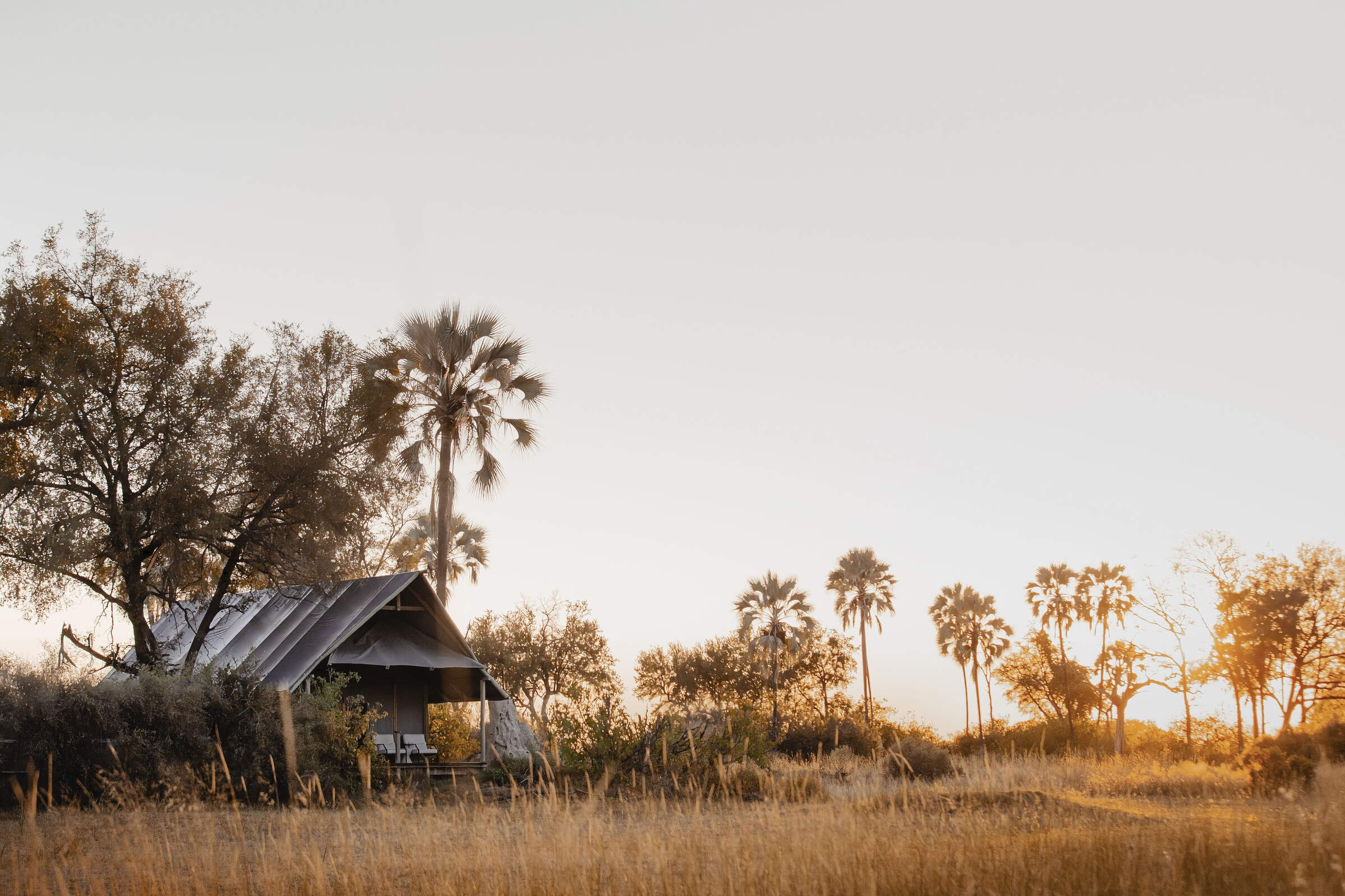
Chitabe Lediba
Chitabe Lediba, in Botswana's southern Okavango Delta, is a small family friendly safari camp; it offers great dry-land safaris and in our experience consistently delivers good game sightings.
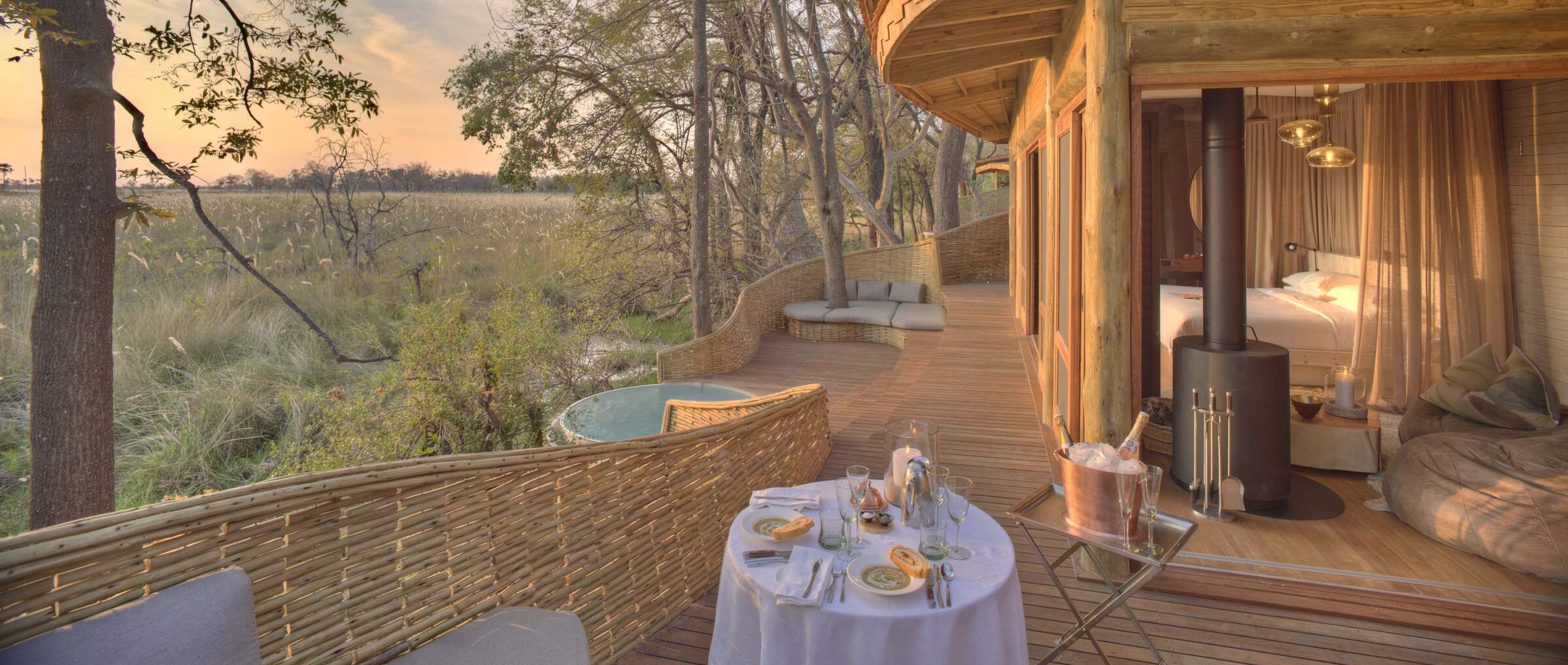
Sandibe Safari Lodge
The luxurious Sandibe Okavango Safari Lodge lies in a private concession in the heart of the Okavango Delta, beside Moremi Game Reserve, with superb big-game viewing.
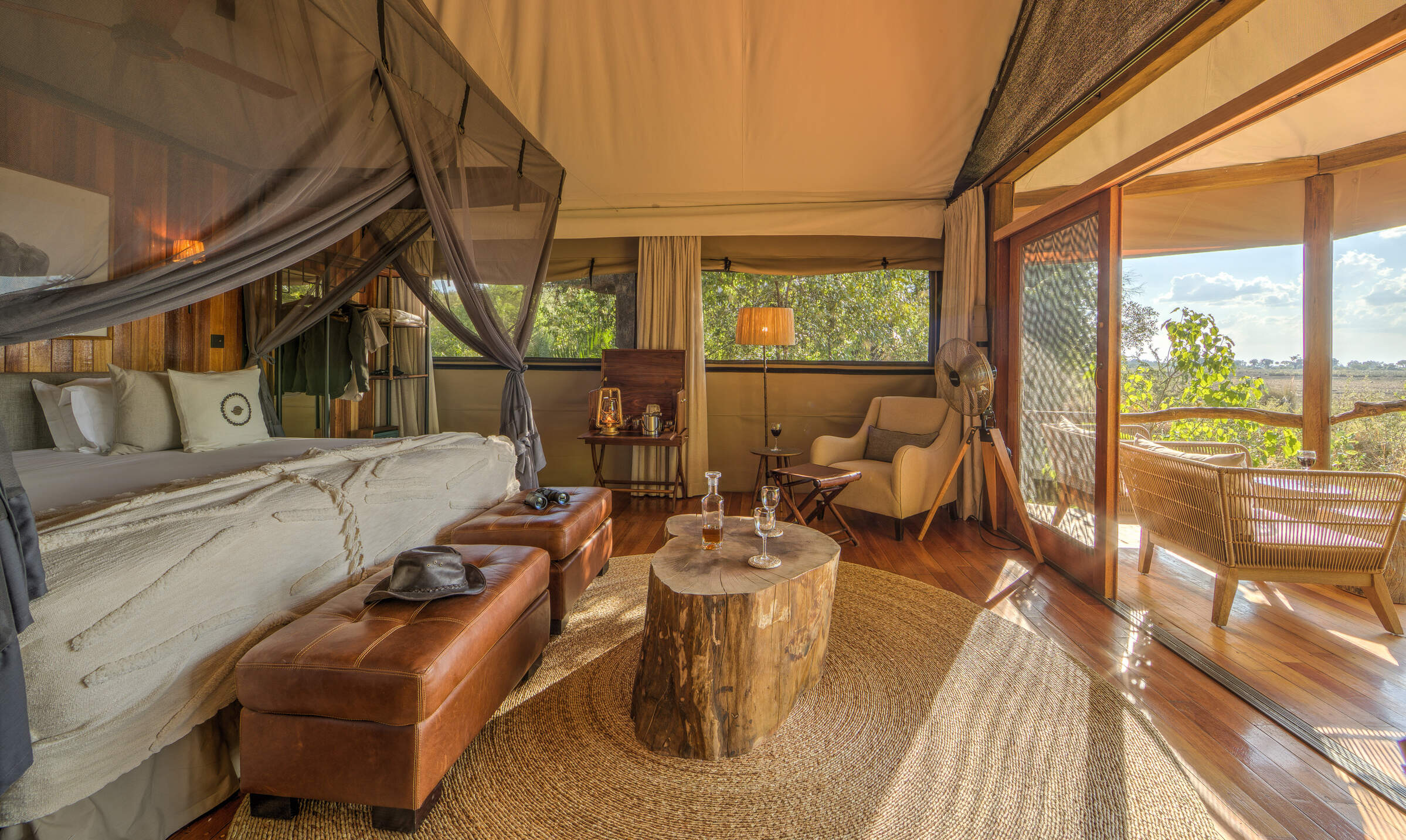
Kanana
In a beautiful part of the Delta, Kanana focuses on fantastic water activities and birding – including exclusive access to an impressive heronry.
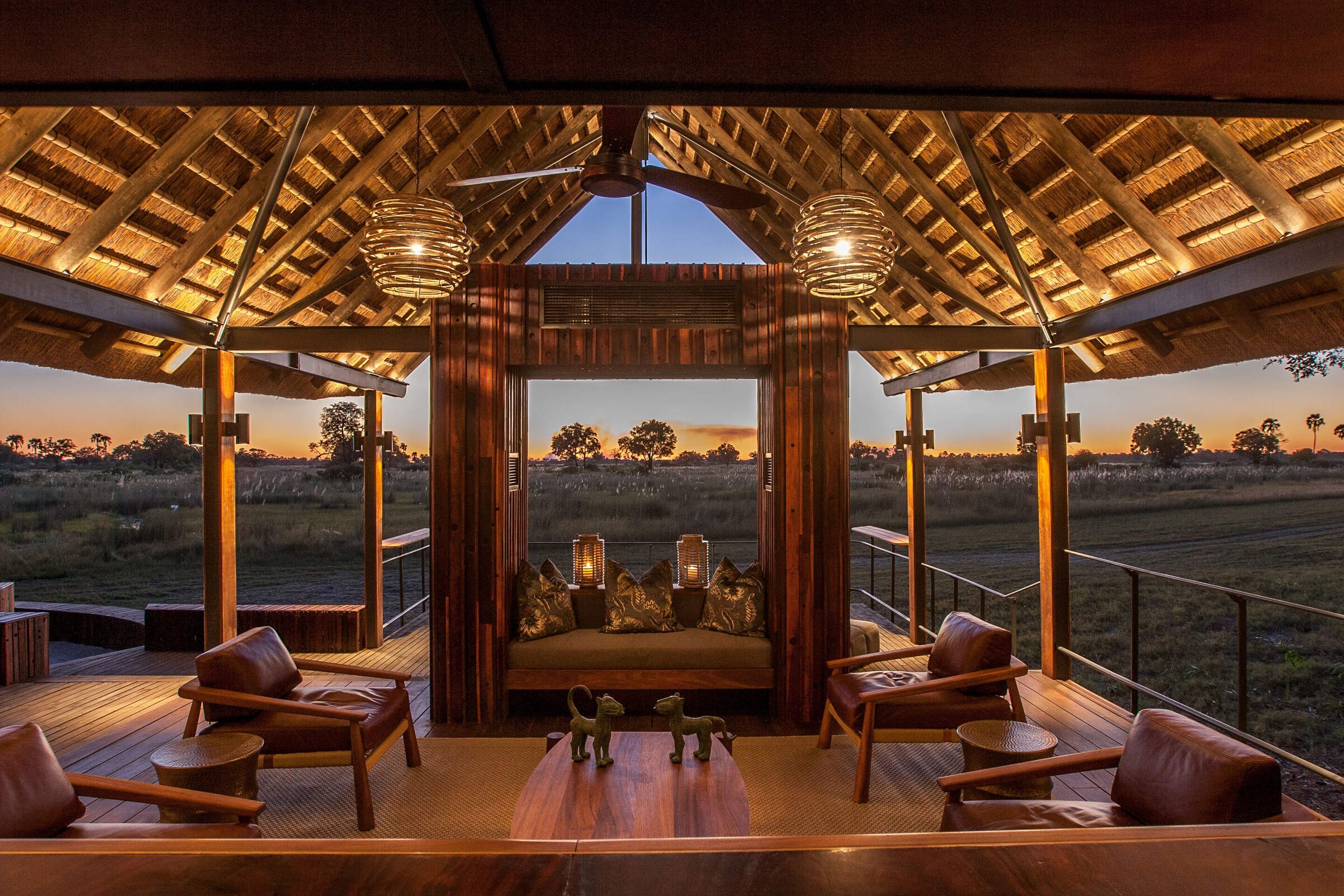
Chitabe Camp
In the southern Okavango Delta, the excellent Chitabe Camp concentrates on dry-land safaris in an area that we've found particularly good for wild dog sightings.
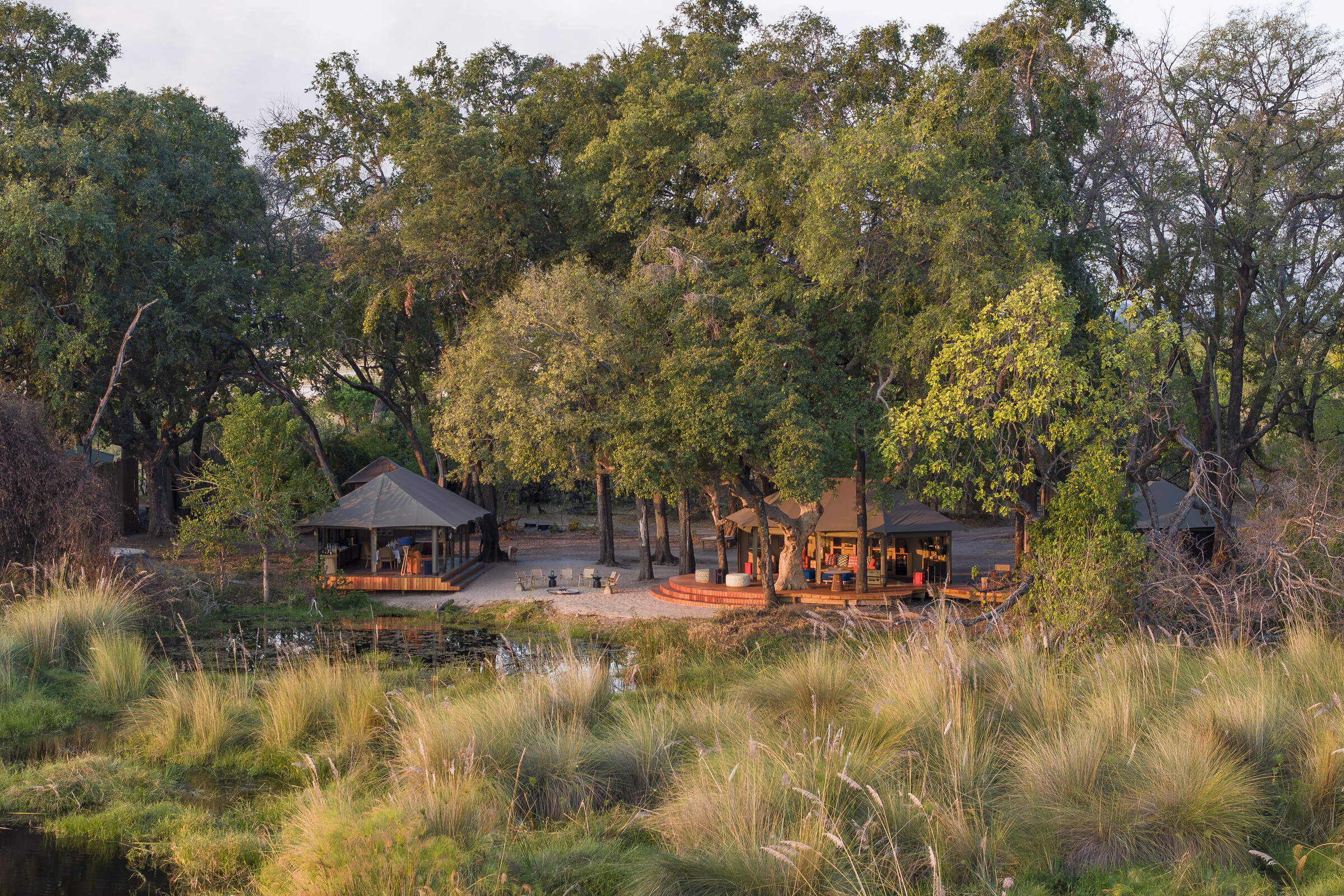
Shinde Footsteps
Small and simple, but comfortable, Shinde Footsteps focuses on walking safaris as well as game drives; it also runs a special children's programme so is particularly suitable for families.
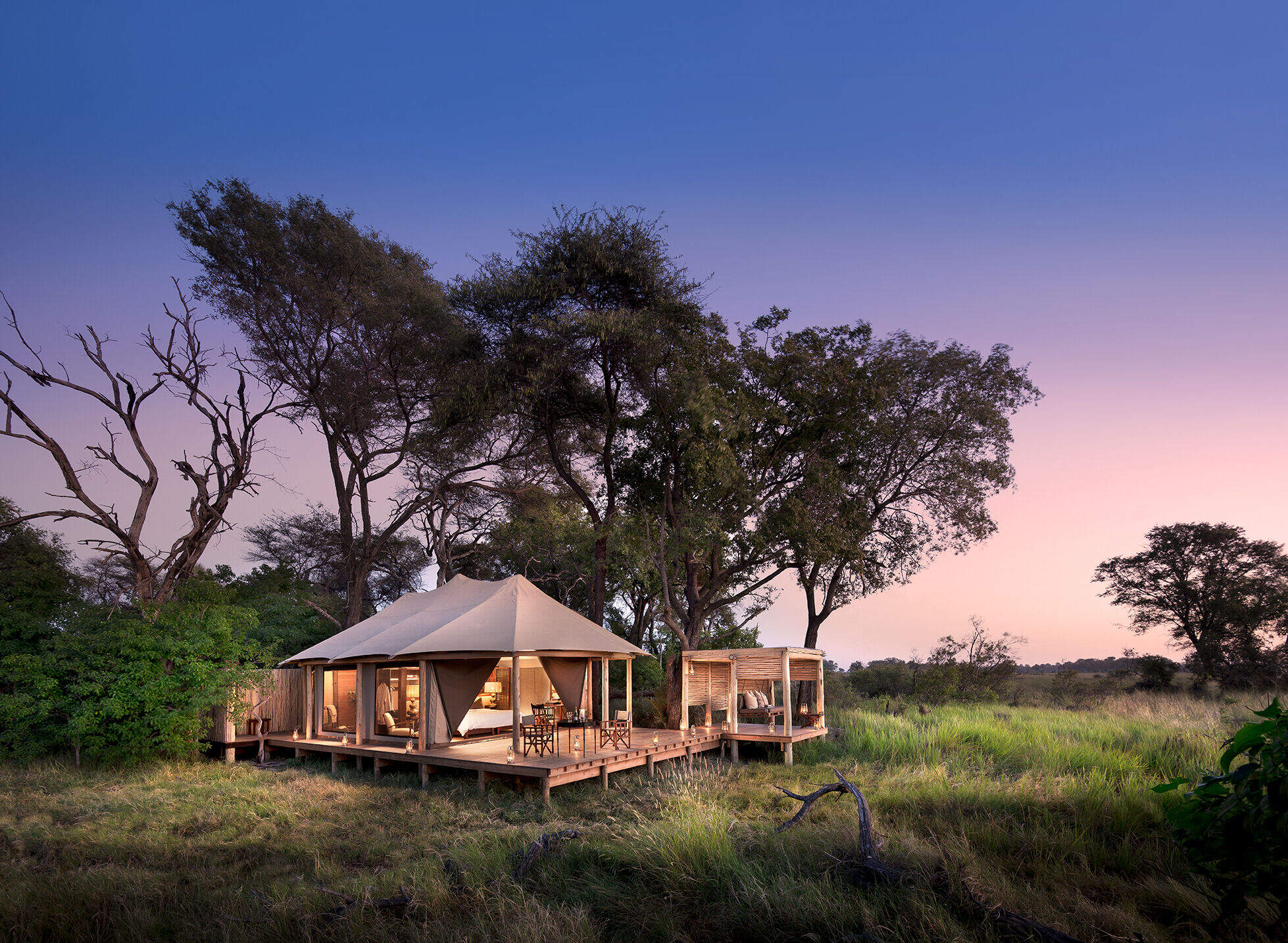
Nxabega Tented Camp
Nxabega offers a selection of both land- and water-based activities, plus very good guiding, food and service, but game viewing can be somewhat erratic.
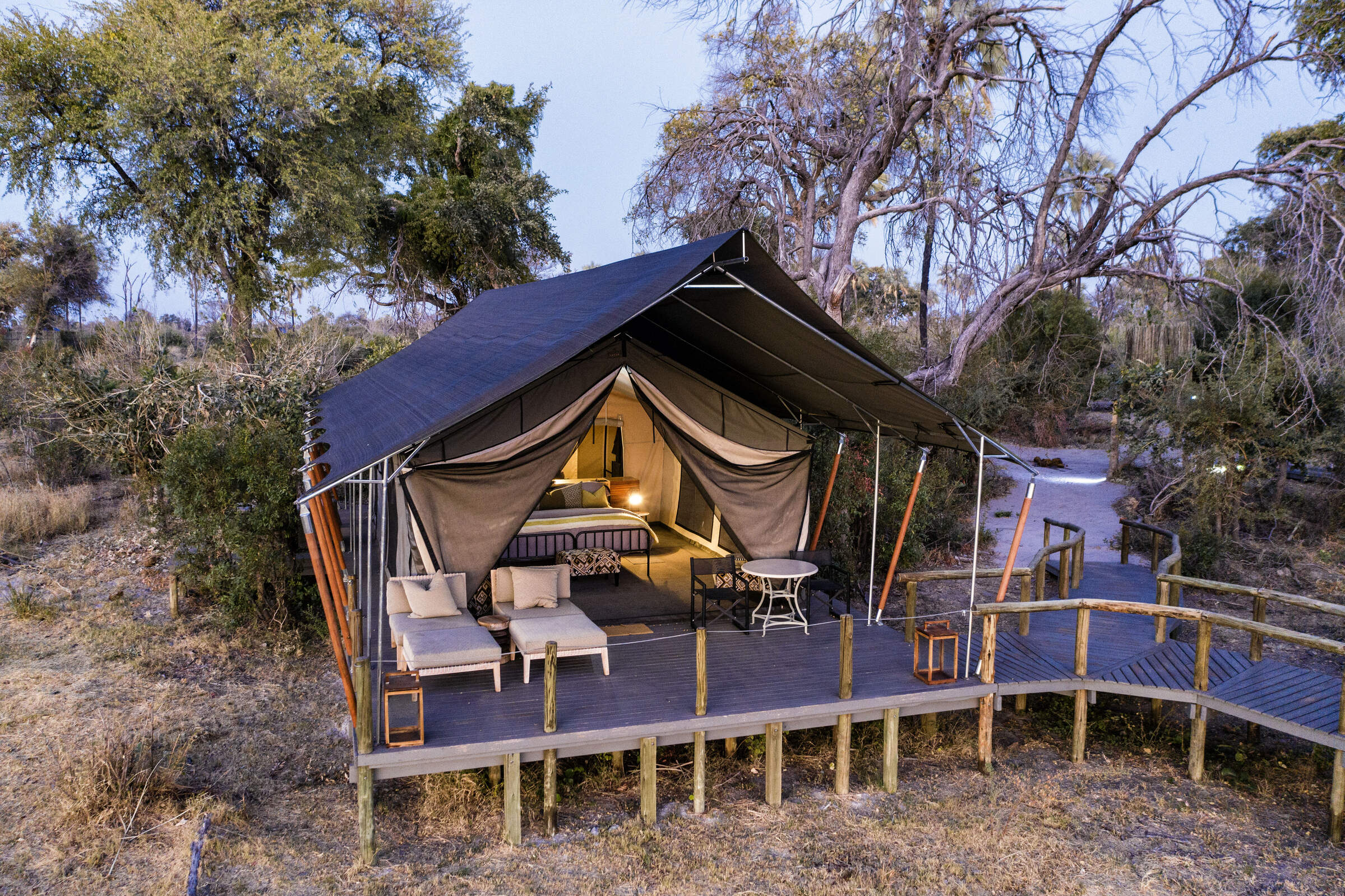
Gomoti Plains
Overlooking a tributary of the Gomoti River, Gomoti Plains Camp is a classically designed camp with very comfortable tents in a good game-viewing area.
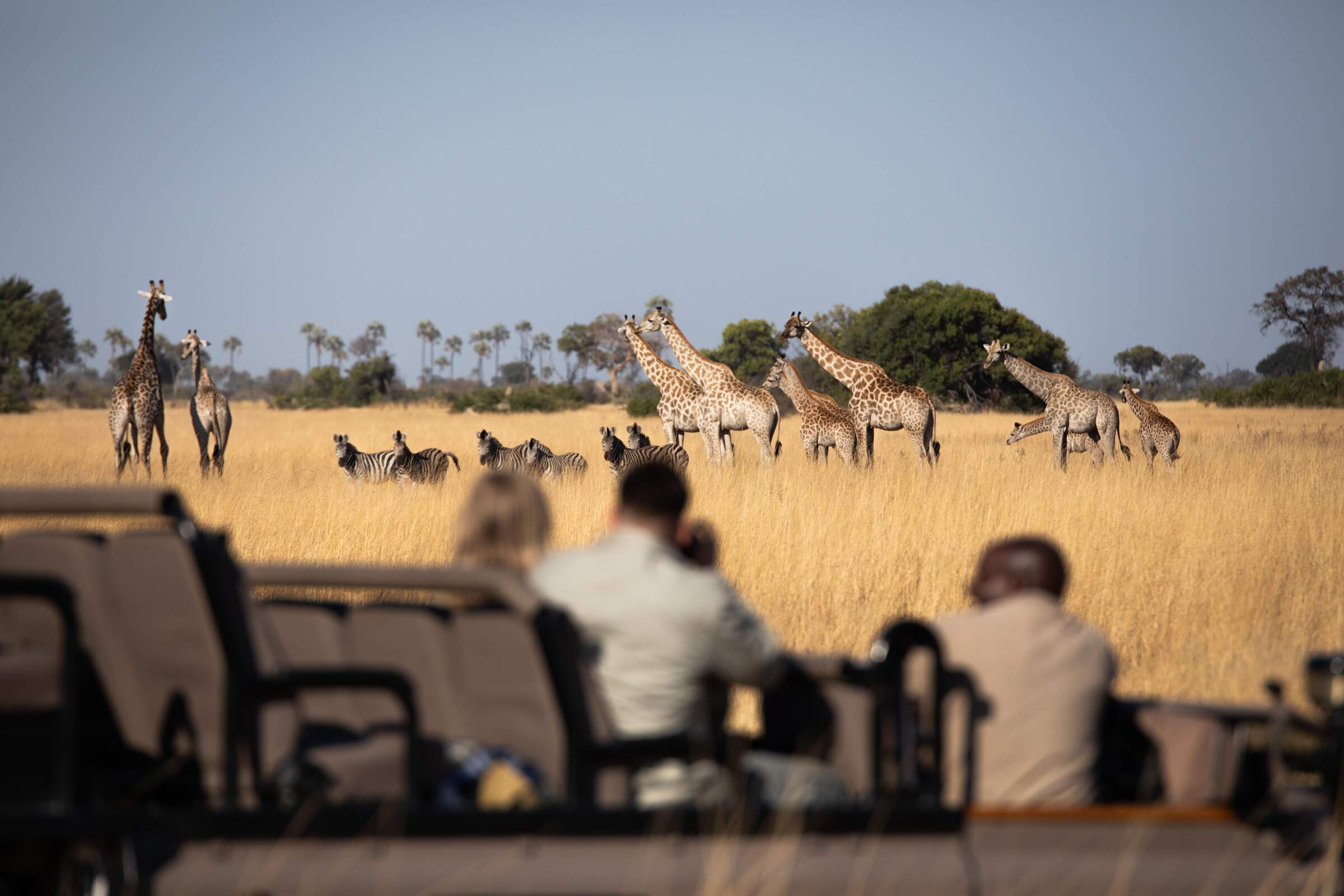
Tubu Tree Camp
A traditional tented camp with a distinctive tree-house feel, Tubu Tree offers some of the best game viewing in the Jao Reserve.
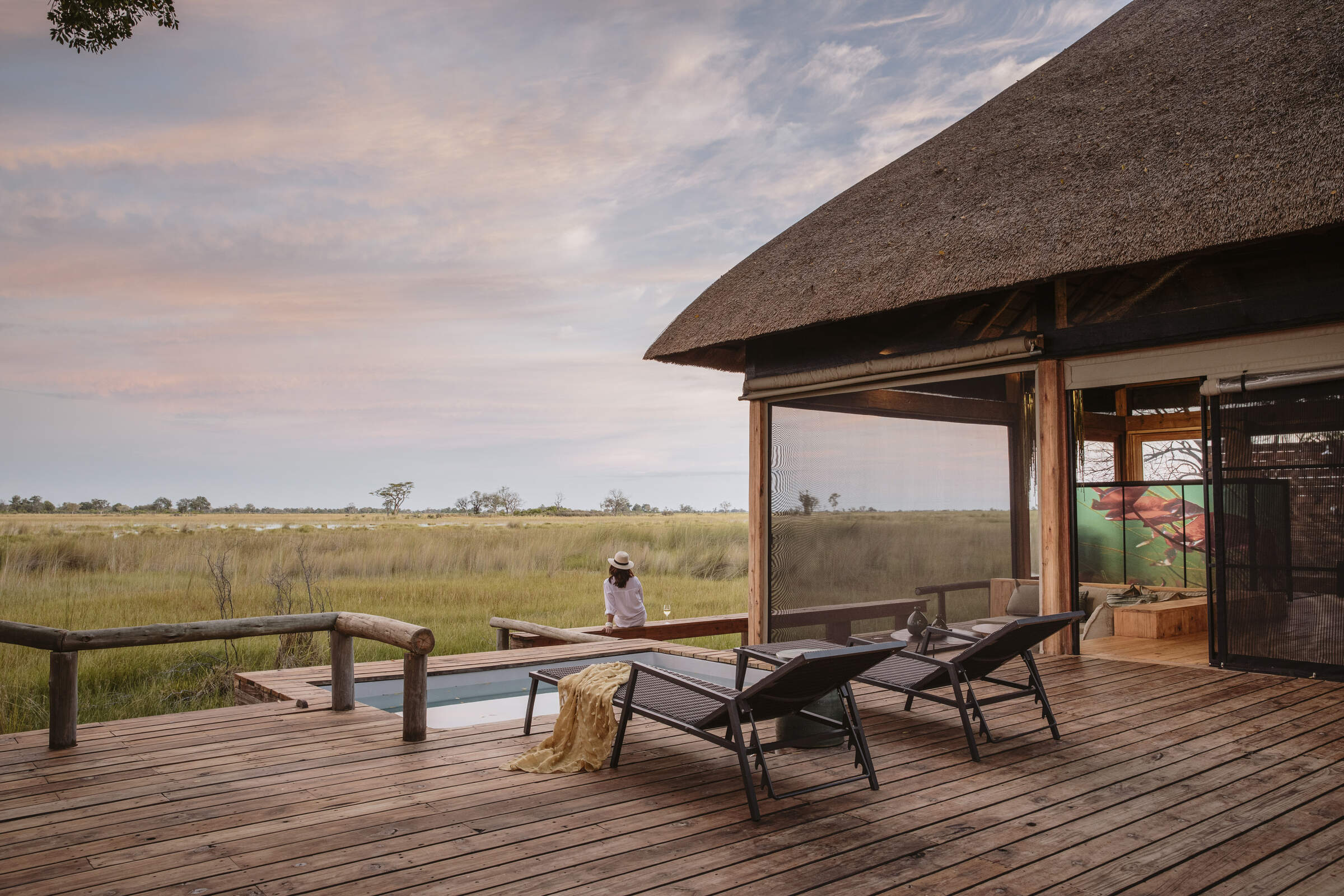
Vumbura Plains
Indulgently stylish and luxurious, Vumbura Plains offers superb game viewing and birding on an exceptionally varied private reserve.
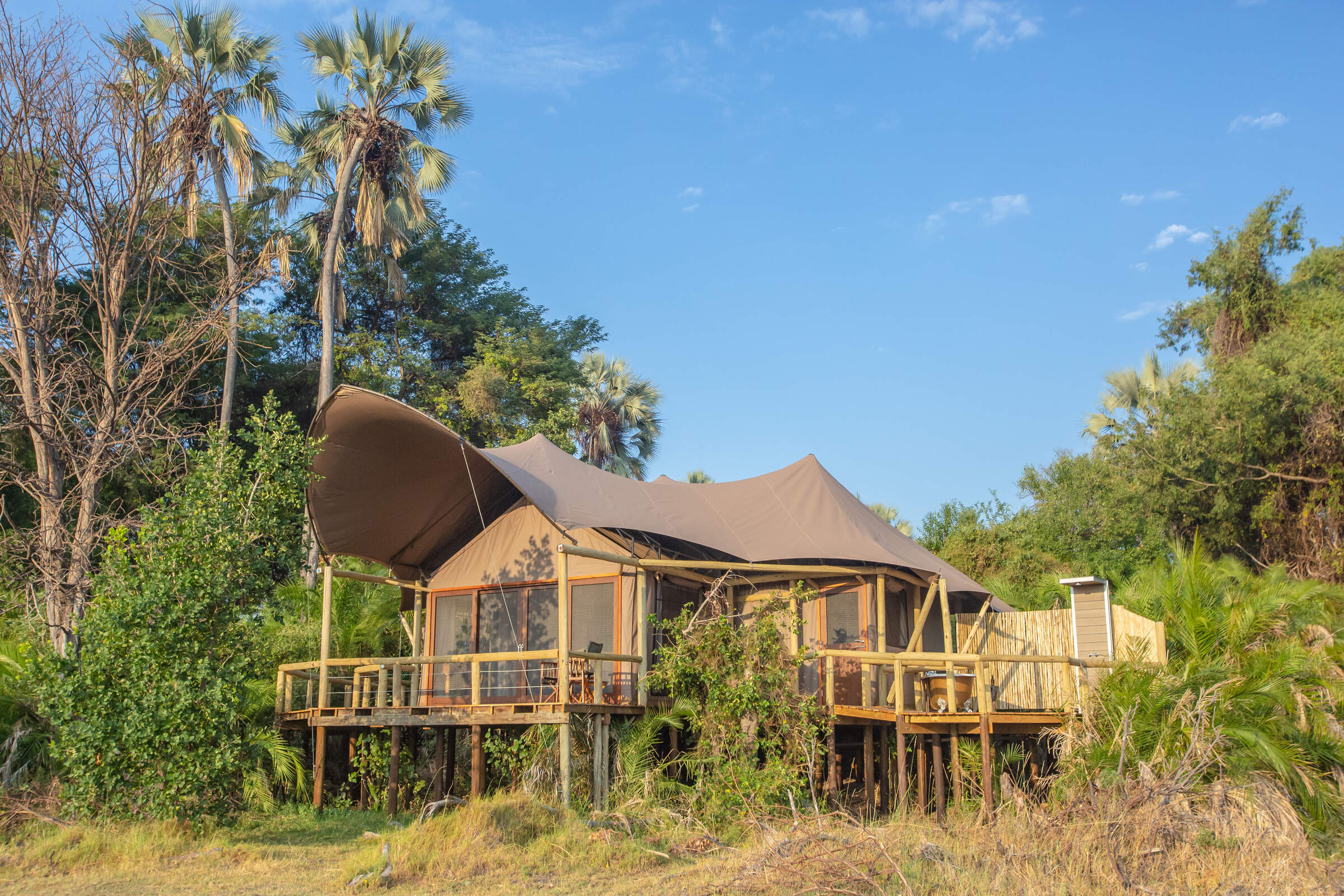
Jacana Camp
Jacana Camp is a small safari camp with an informal island feel; it is ideal for water-based activities in the Delta and offers excellent birdwatching.
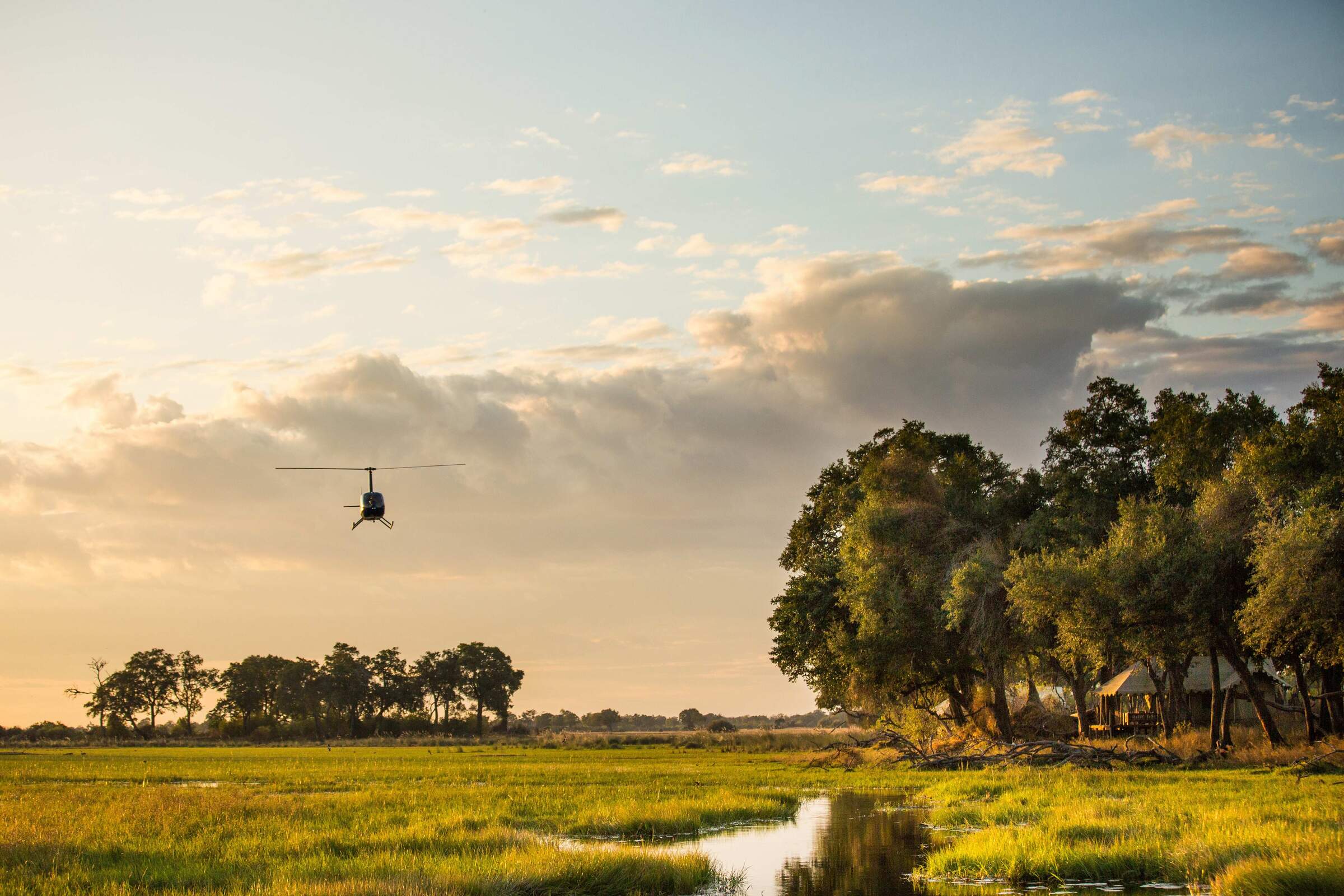
Duba Explorers Camp
Intimate and elegant, Duba Explorers Camp promises a firm safari focus in a remote corner of the Okavango, led by a team who value the highest guiding and hosting standards.
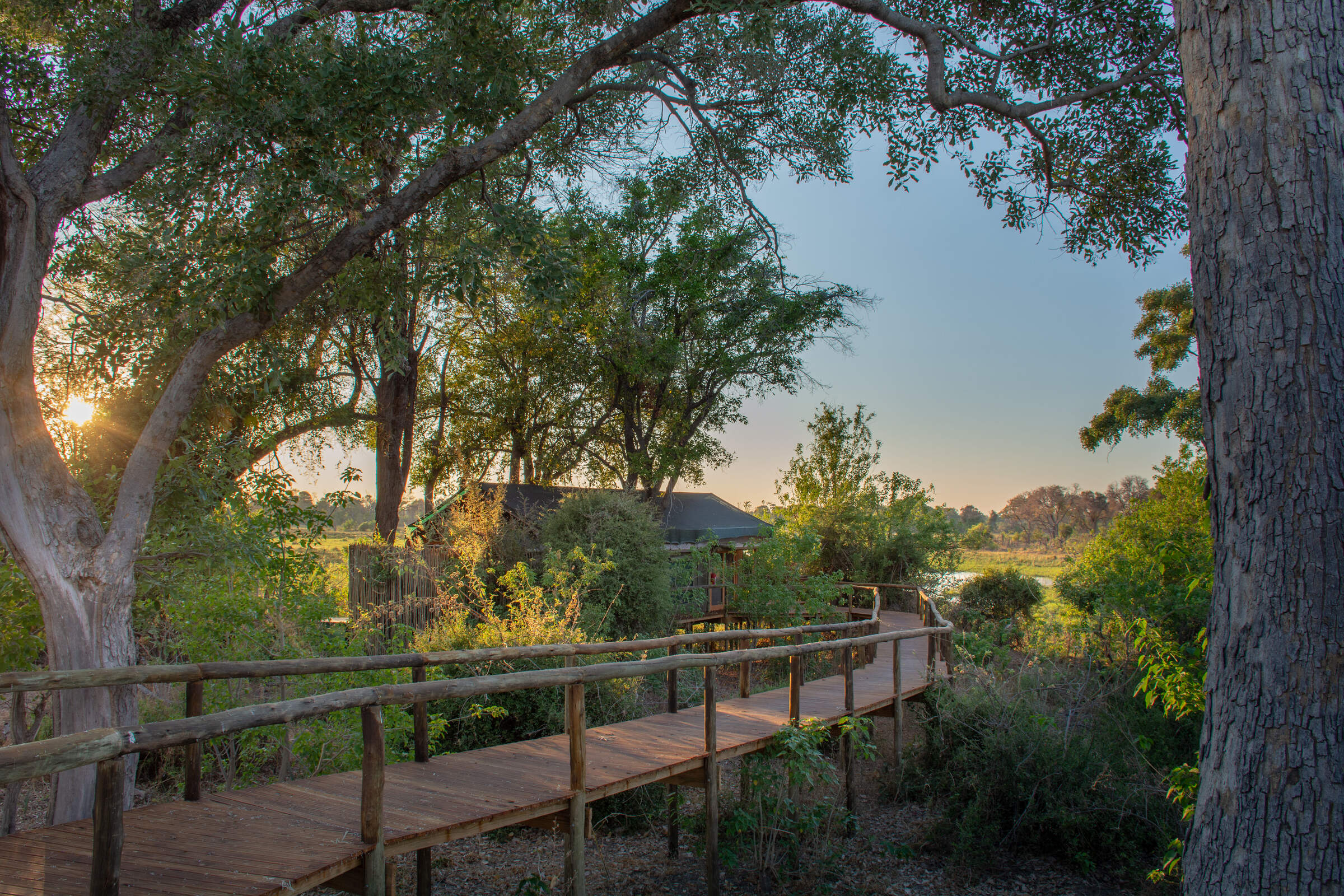
Mma Dinare
Beautifully located in a private concession overlooking the Gomoti River, the traditional Mma Dinare is very well-priced for the Okavango Delta.
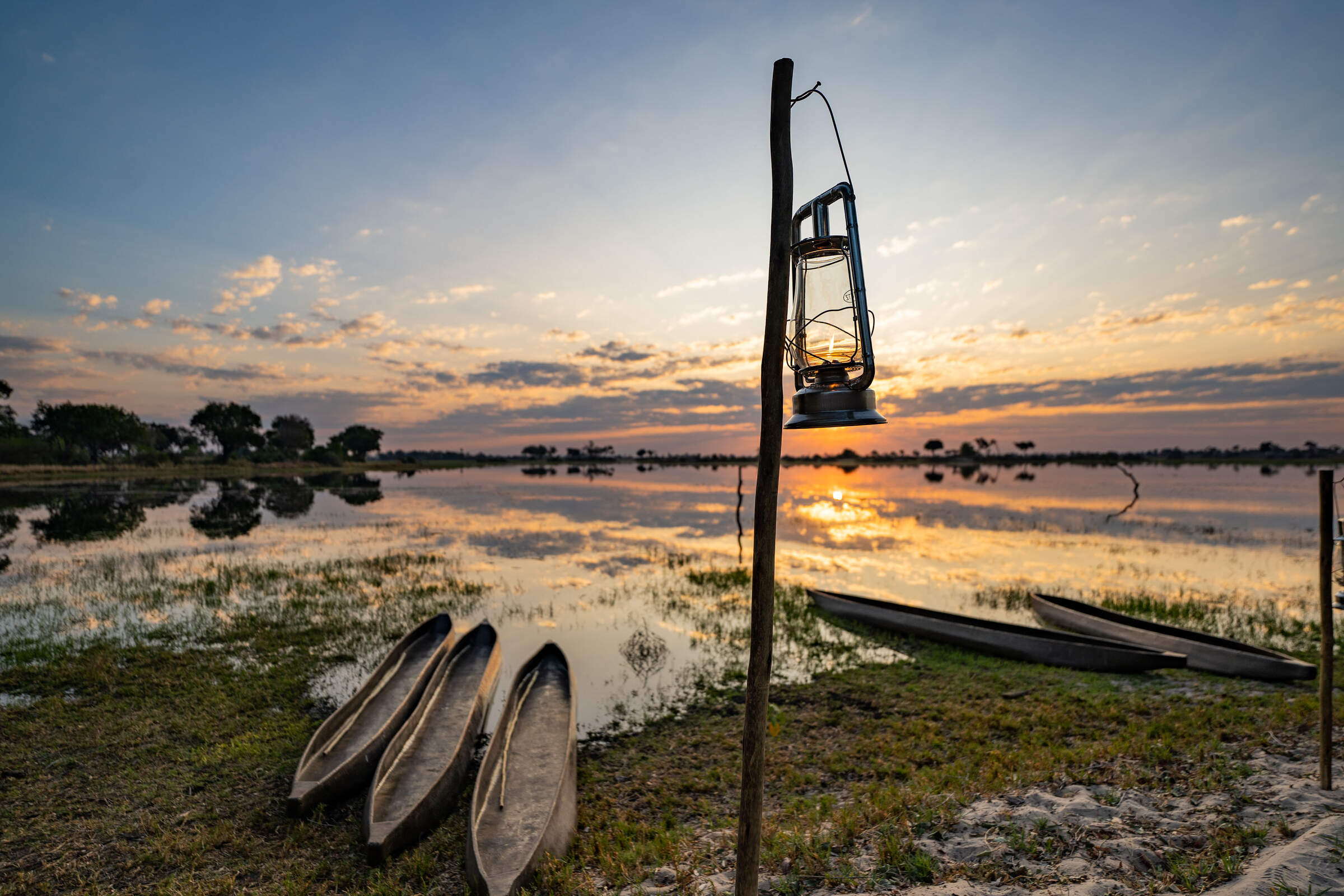
Pom Pom Camp
Amidst stunning Okavango Delta scenery, Pom Pom offers idyllic mokoro trips in season, great birdwatching, and increasingly good big-game sightings, especially leopards.
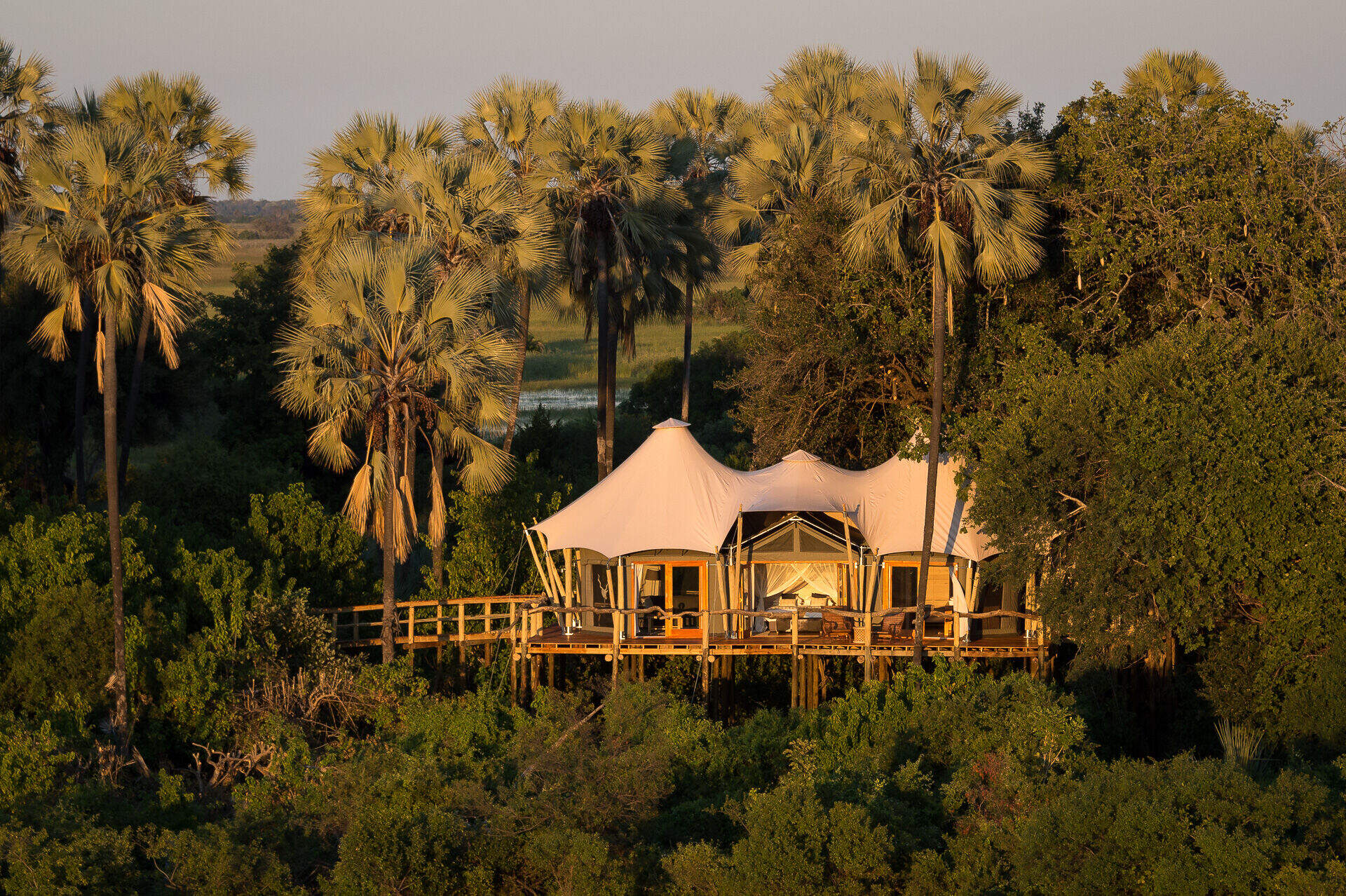
Kwetsani Camp
Deep in the Delta, overlooking a floodplain, Kwetsani Camp is a small, high-end camp with good access to areas for land and water-based activities.
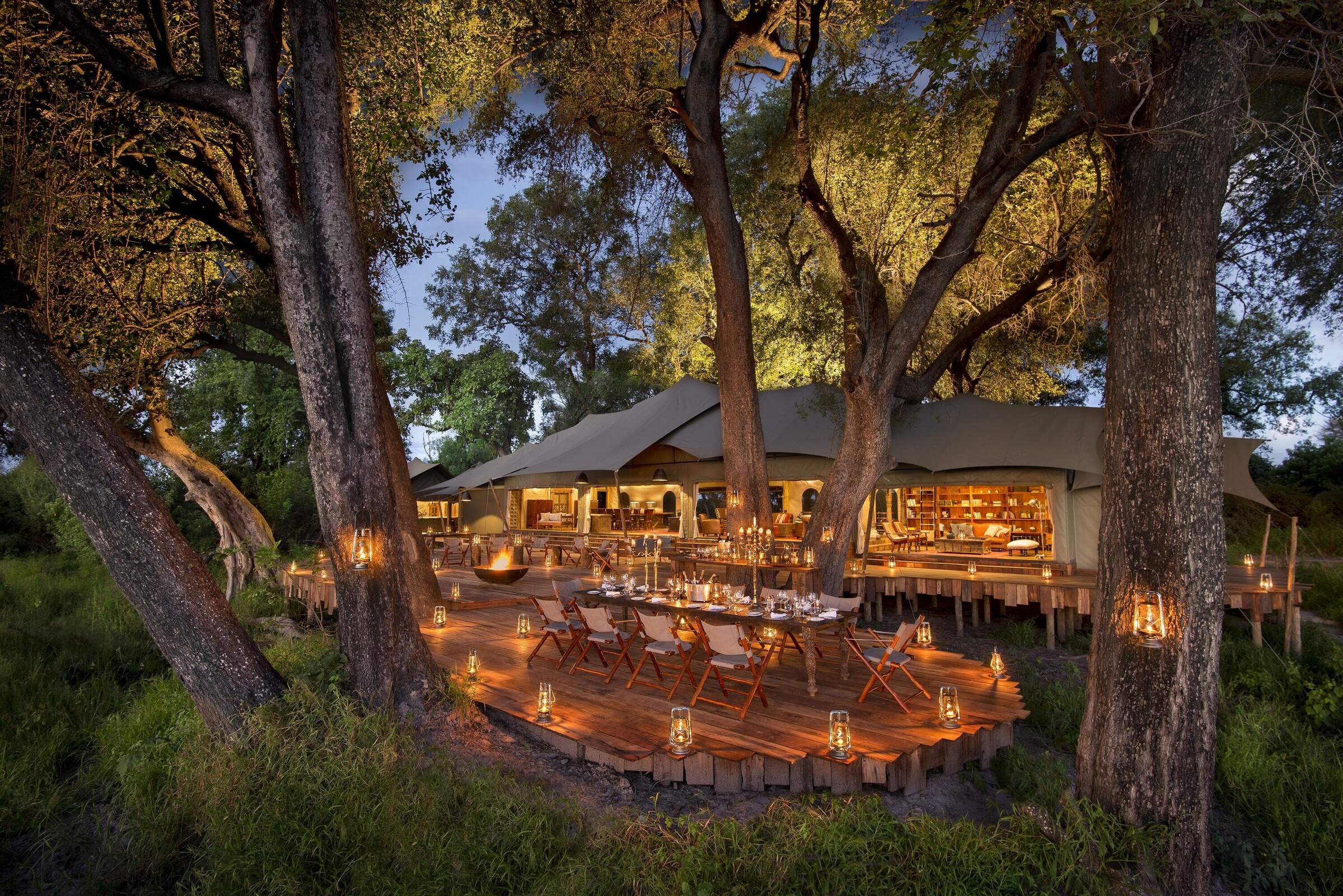
Duba Plains Camp
Duba Plains Camp is a traditional yet luxurious safari camp, best known for the thrilling lion behavior interaction that is often see during the day.
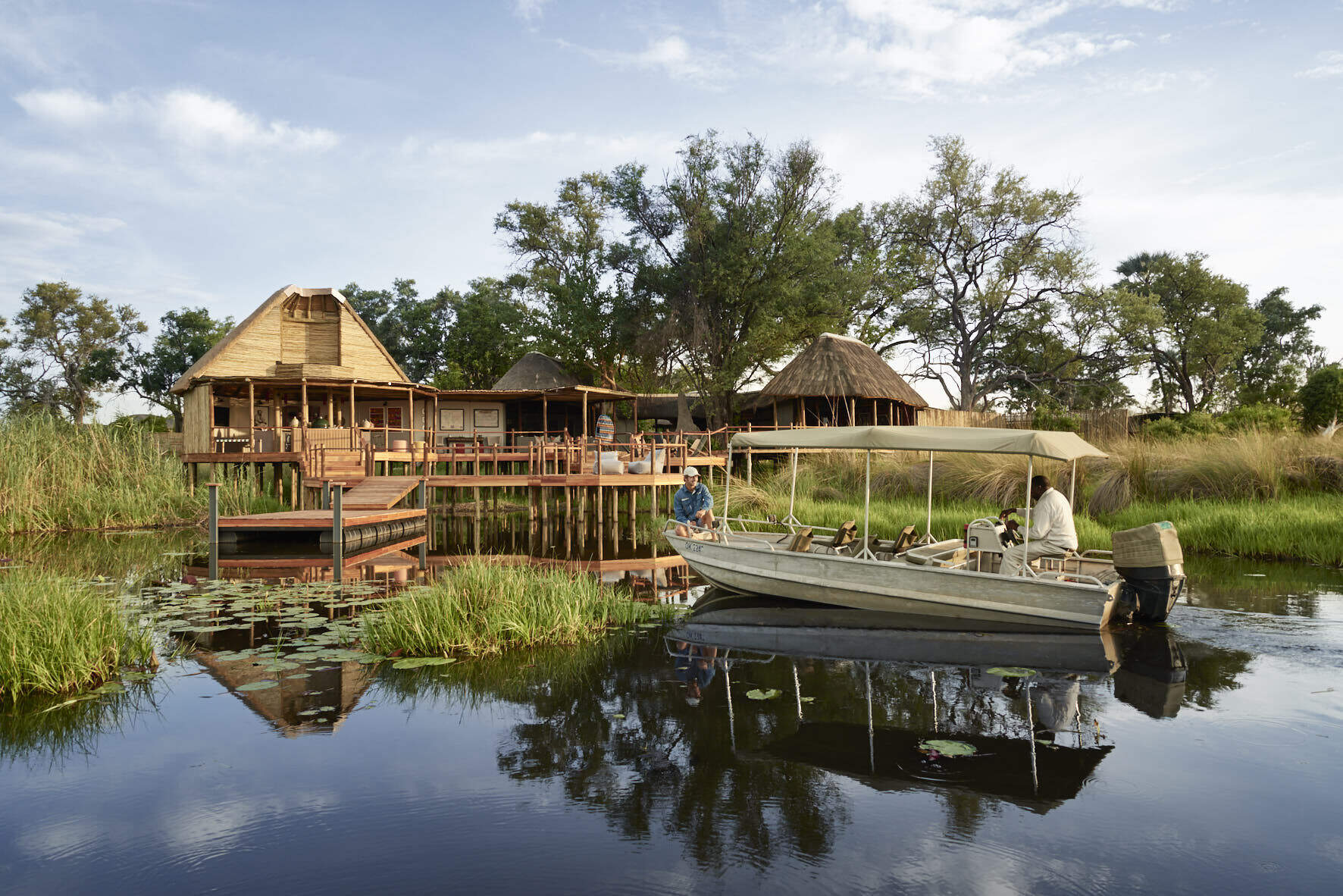
Baines' Camp
Baines' Camp is a well-run, intimate camp in a pretty part of the Okavango, offering a range of activities and the option to spend a morning walking with elephants.
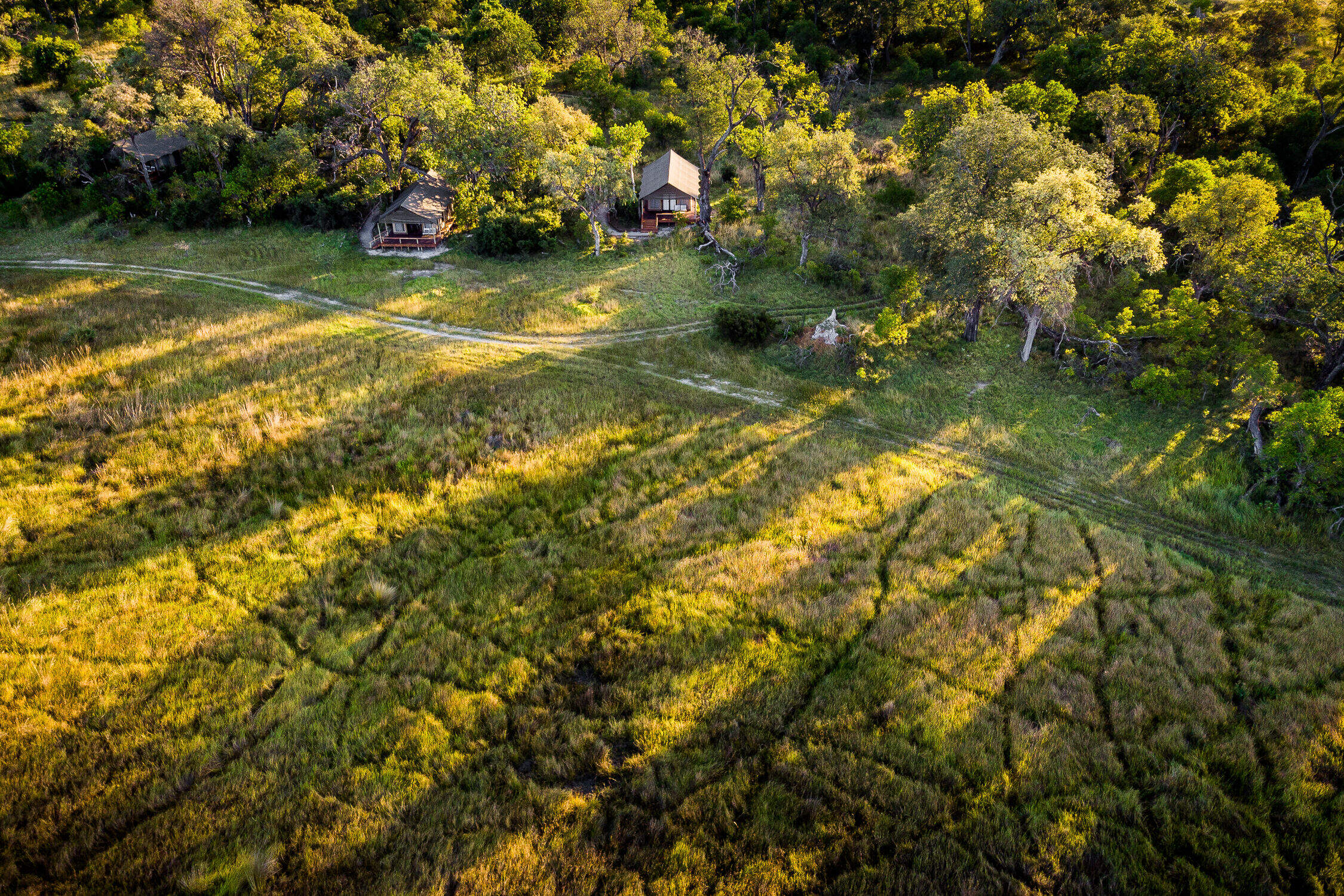
Stanley's Camp
In a private concession south of Moremi Game Reserve, Stanley's Camp offers 4WD game drives, seasonal water activities and a superb elephant interaction.
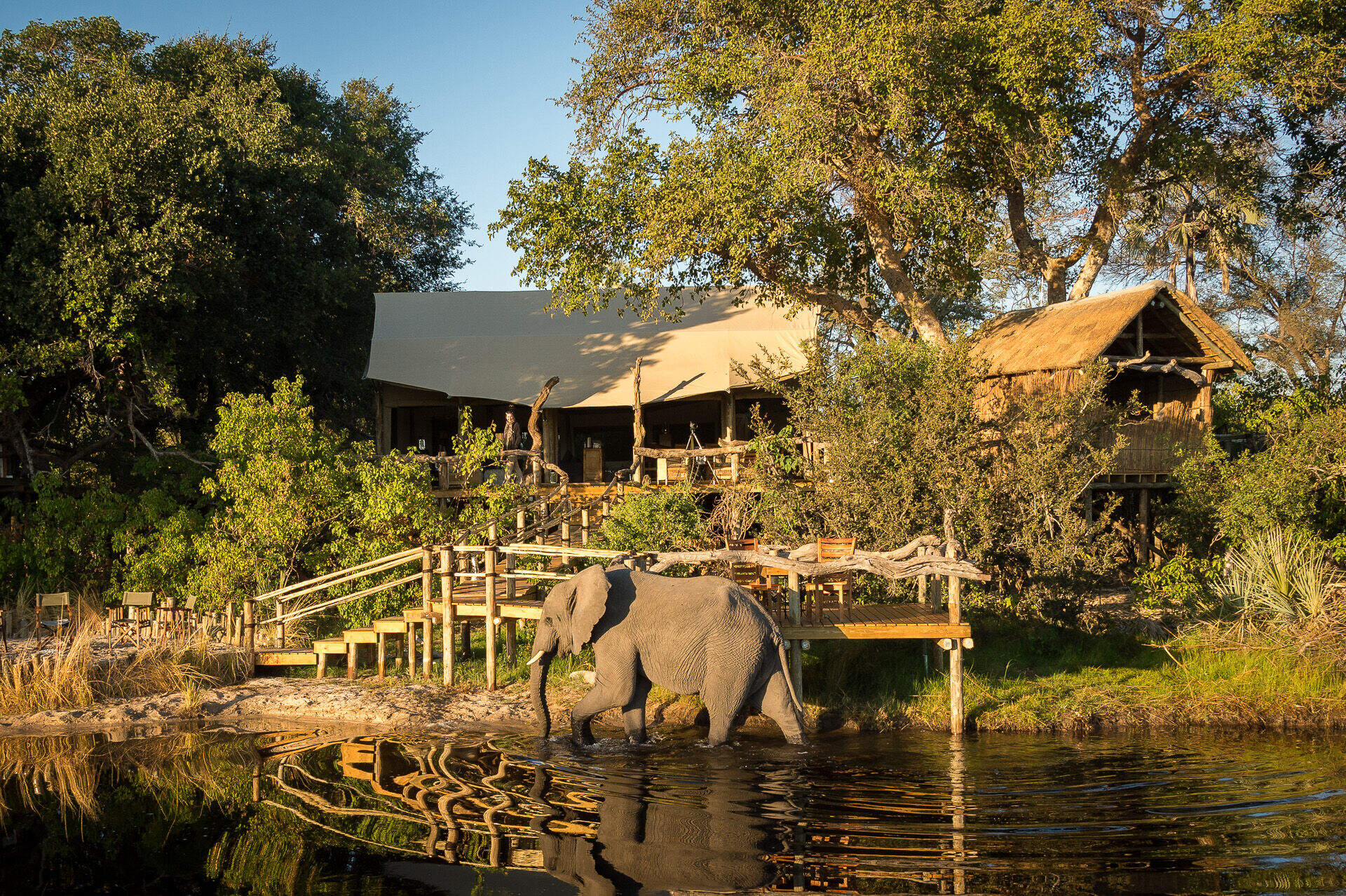
Little Tubu
Little Tubu is a new, traditional camp with just three tented chalets and a distinctive tree-house feel. The areas around it can be explored by water and land-based activities year round.
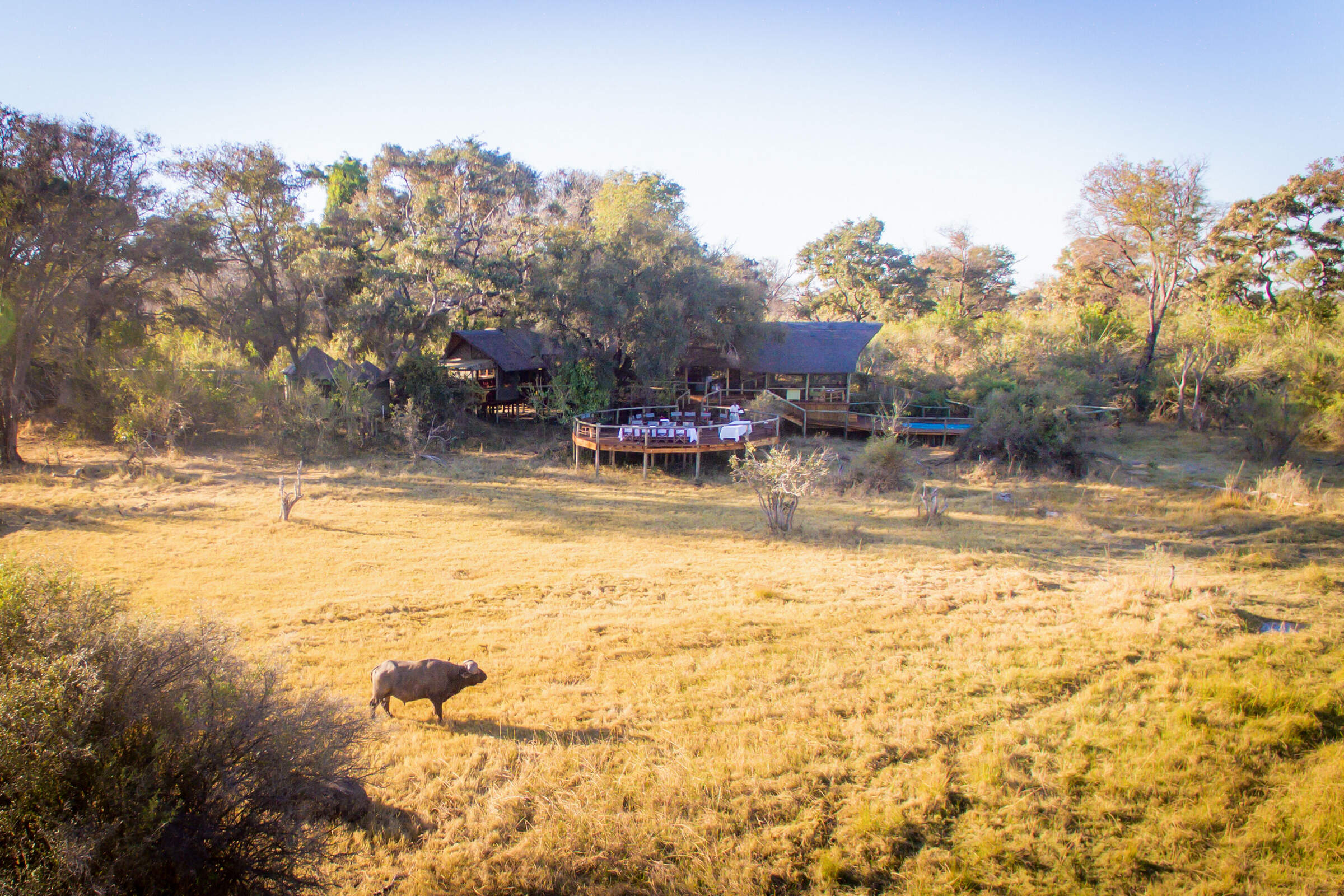
Rra Dinare
Located in a private concession in the southern reaches of the Okavango Delta, overlooking the Gomoti River, Rra Dinare is a traditional-style, well-priced camp.
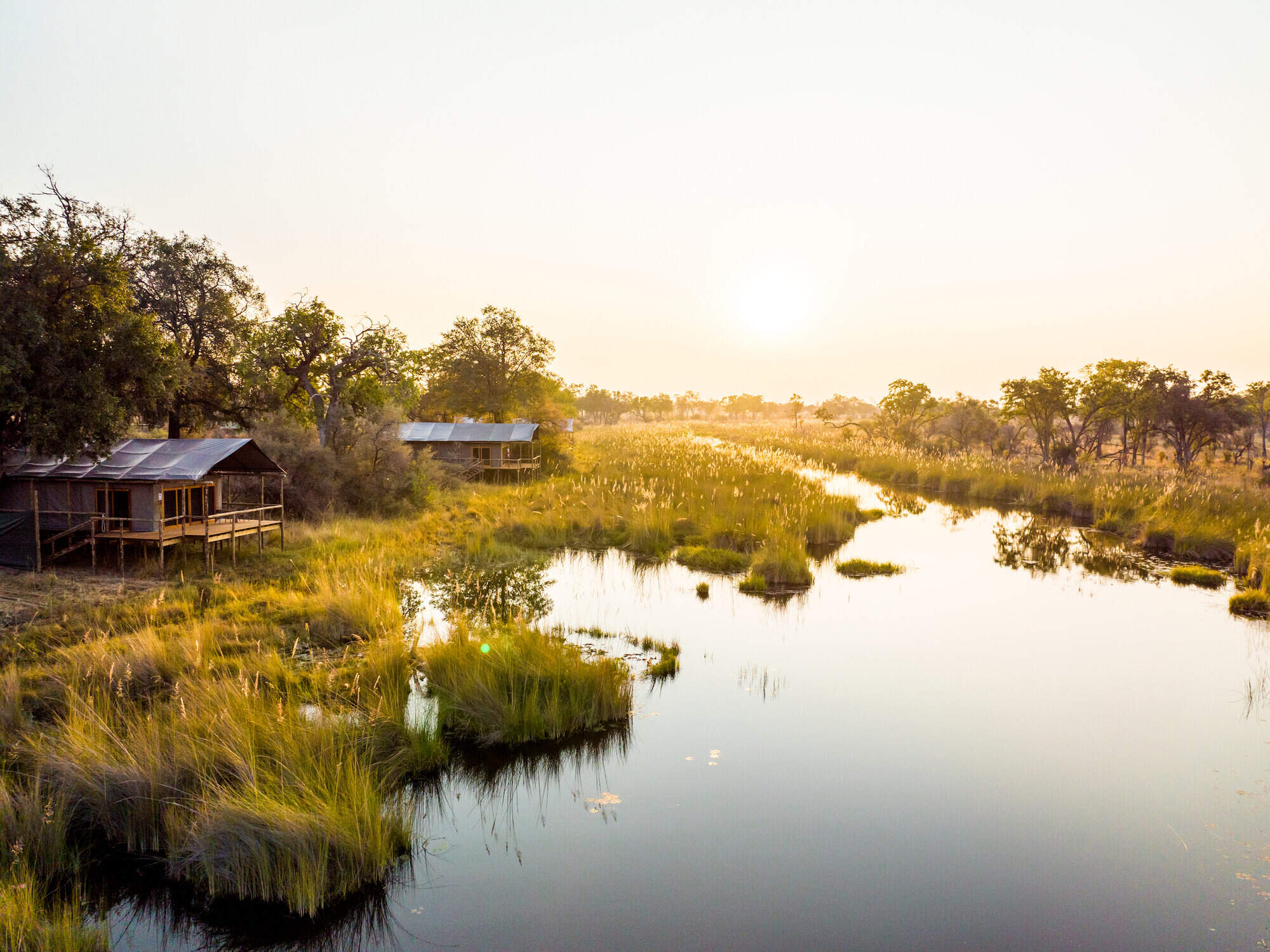
4 Rivers
4 Rivers is a new camp in a previously in accessible area of the excellent Kwara concession.
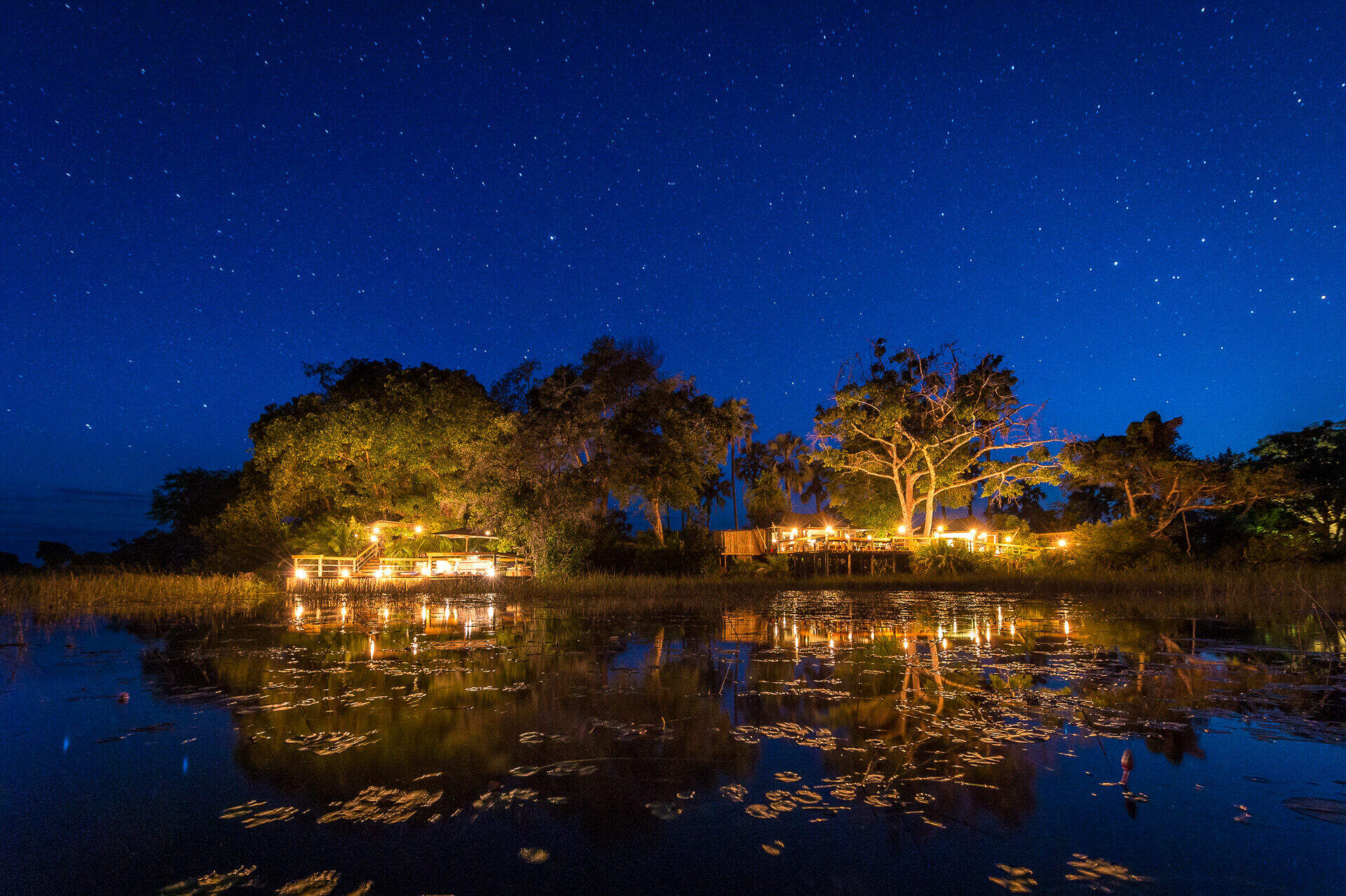
Pelo Camp
In a pristine wilderness environment deep in the Okavango Delta, the seasonal Pelo Camp is tented yet comfortable, with activities focusing on excursions by mokoro.
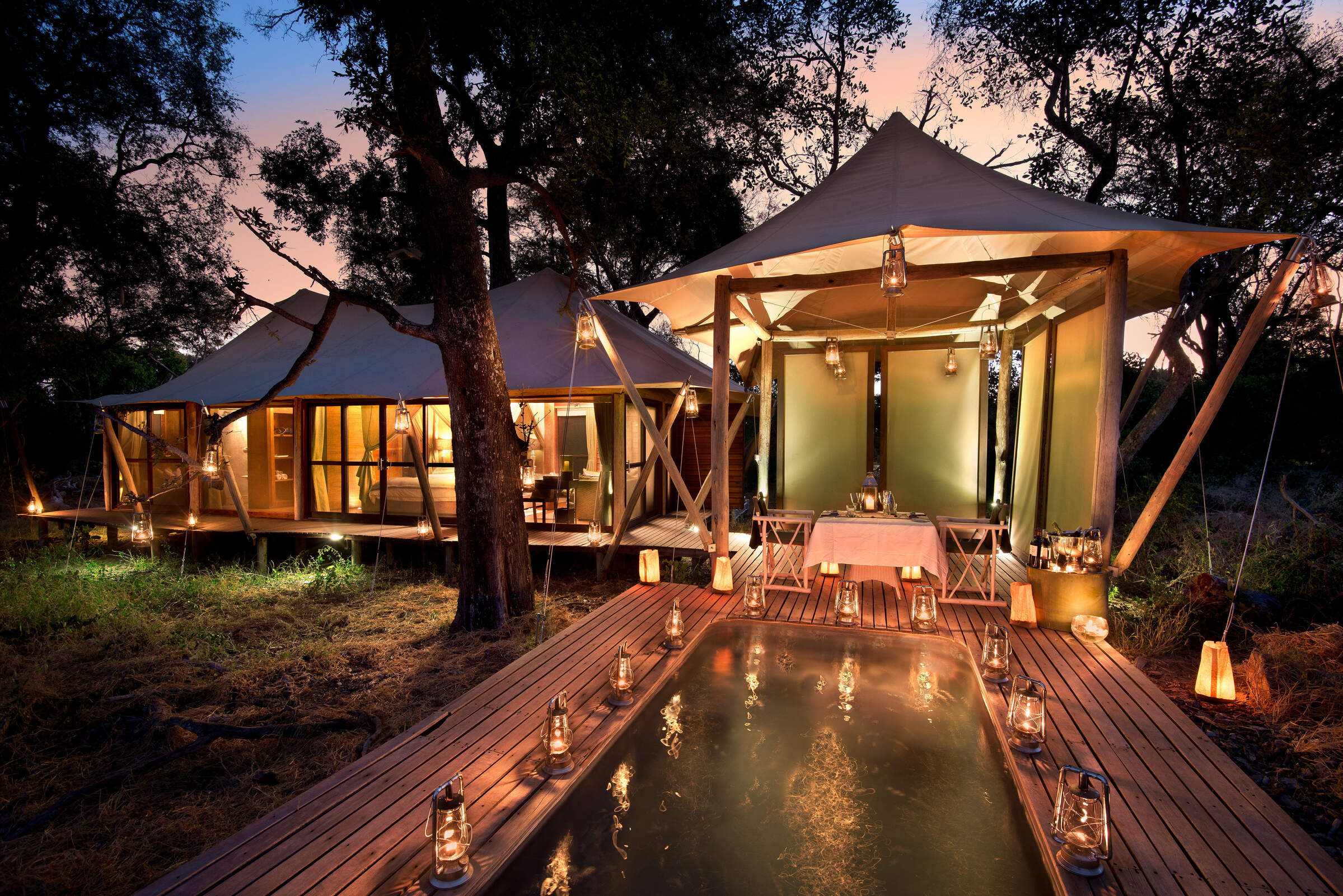
Xaranna
Xaranna is a plush tented camp amongst the idyllic waterways and islands of the Delta. Each air-conditioned tent has a plunge pool. Water activities and pampering are the focus here.
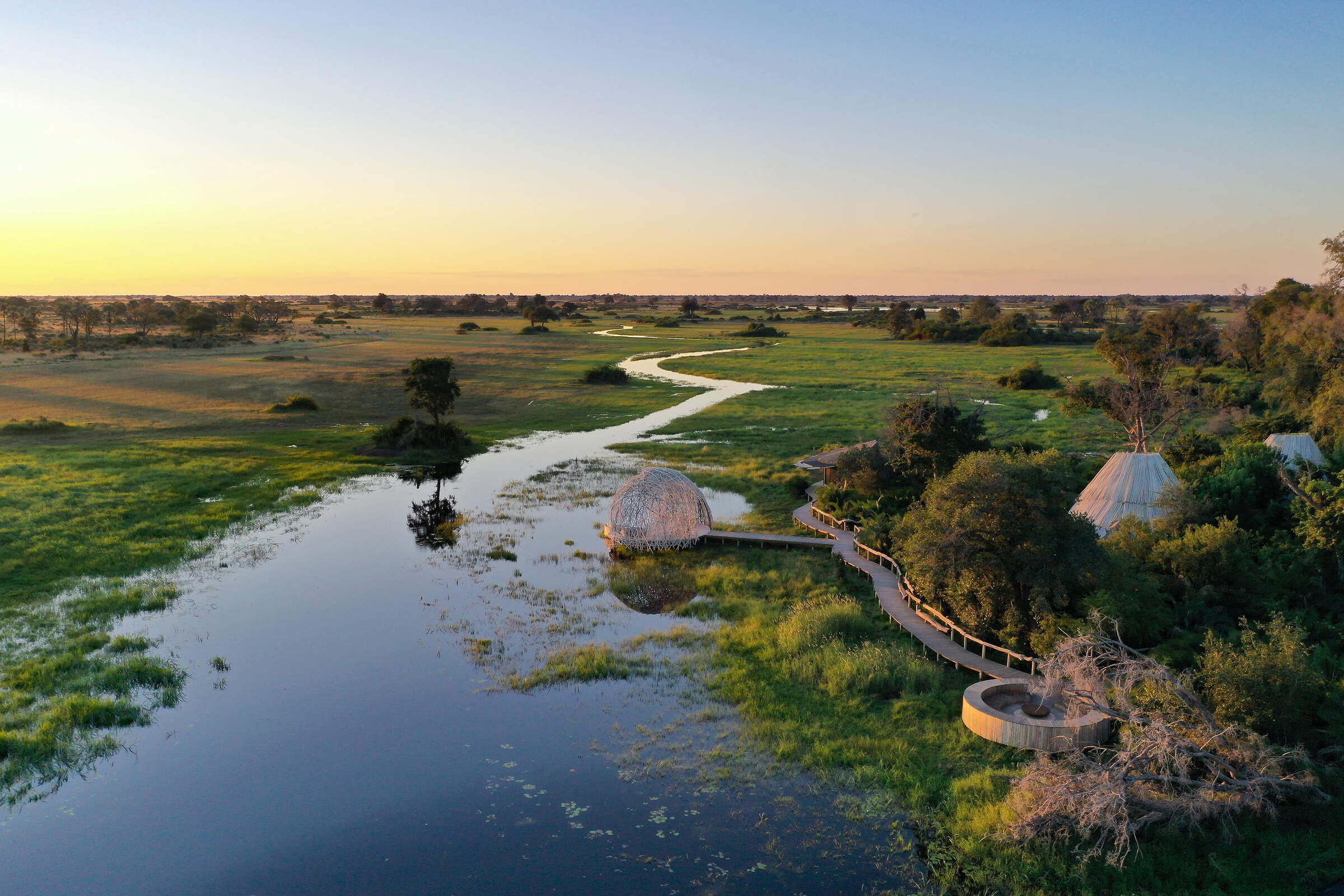
Jao Camp
In a beautiful area with fantastic water activities, Jao combines an idyllic location with high levels of luxury and service, and a top-end spa.
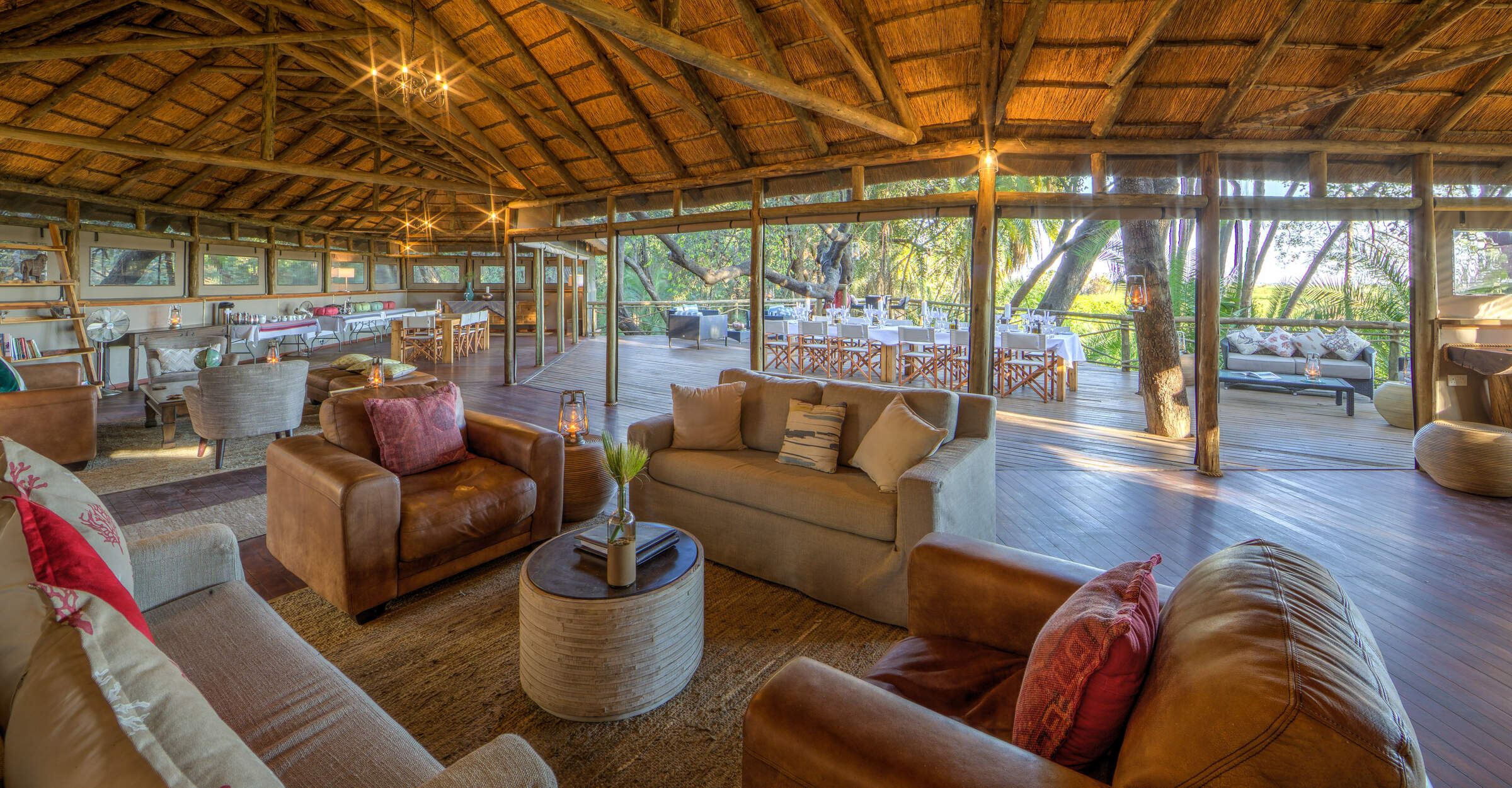
Setari Camp
Setari Camp stands on an island dotted with palm trees, close to the base of the Okavango's 'Panhandle", offering primarily water-based activities.
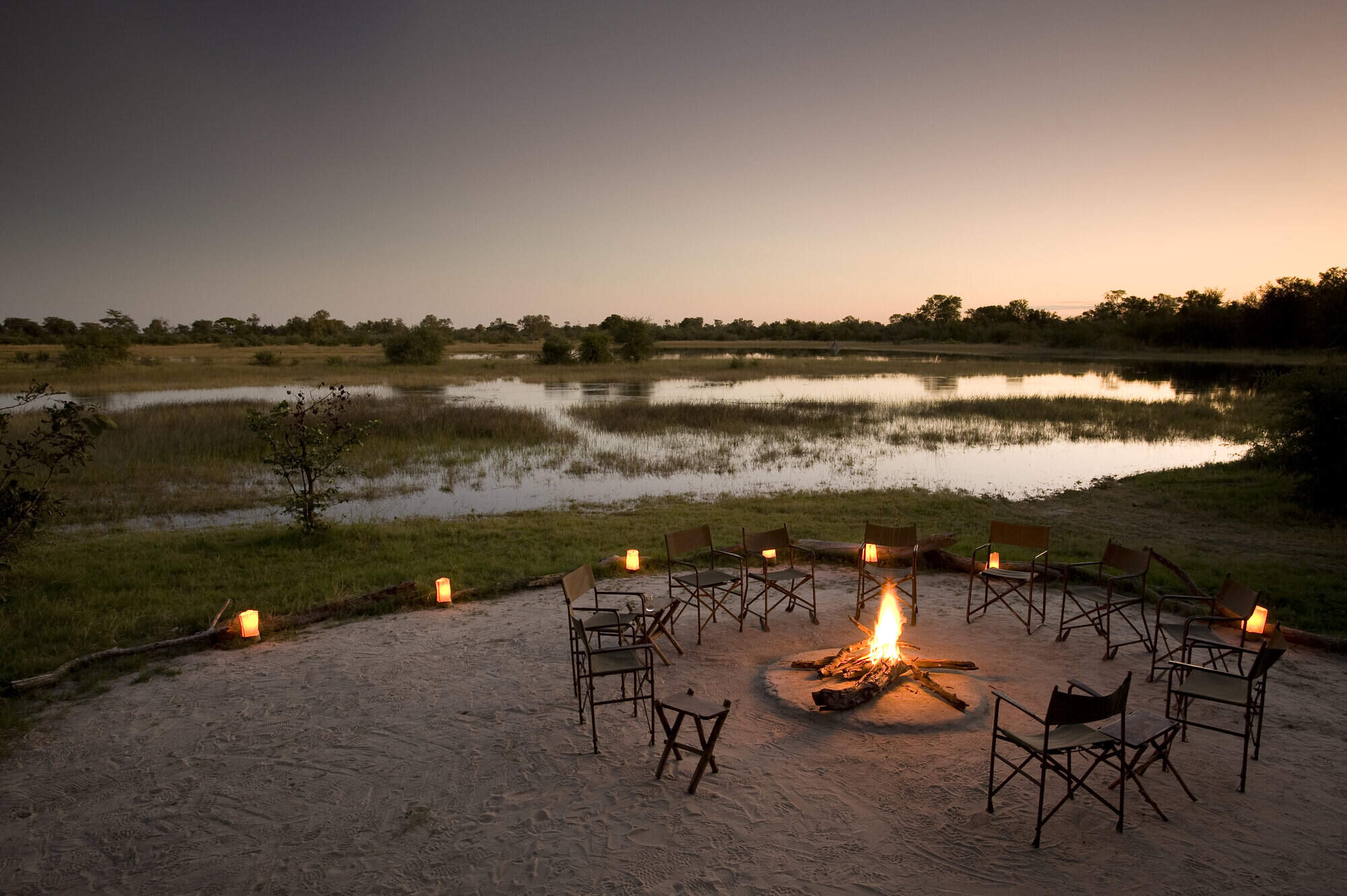
Okavango Explorers
The traditional, tented Okavango Explorers Camp offers a mix of walking, canoeing and game drives led by great guides in a wildlife-rich area.
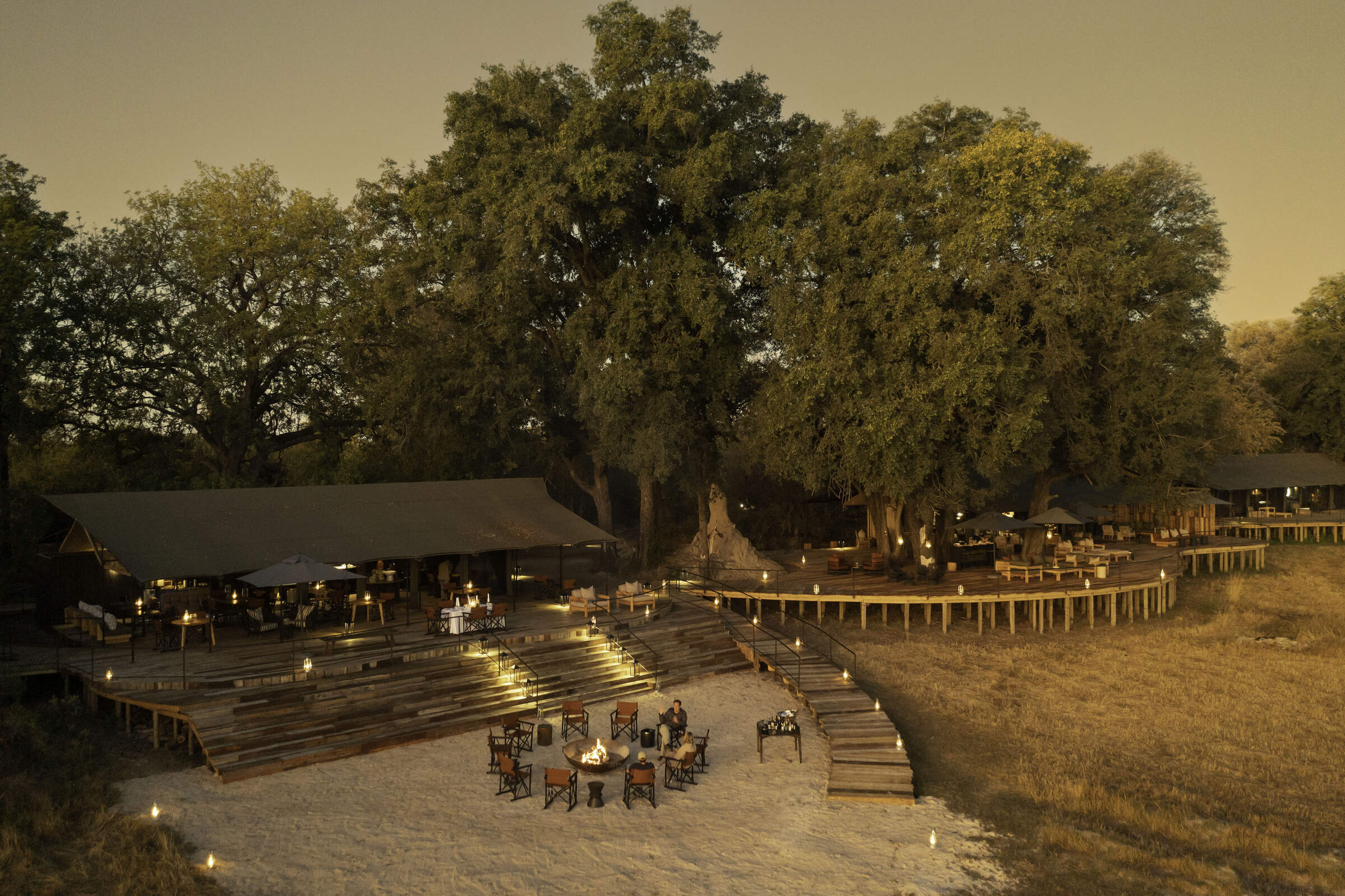
Kiri Camp
Kiri Camp is the latest Okavango offering from the excellent team behind Machaba. In an exciting new location in the heart of the Delta we cannot wait to visit this new camp.
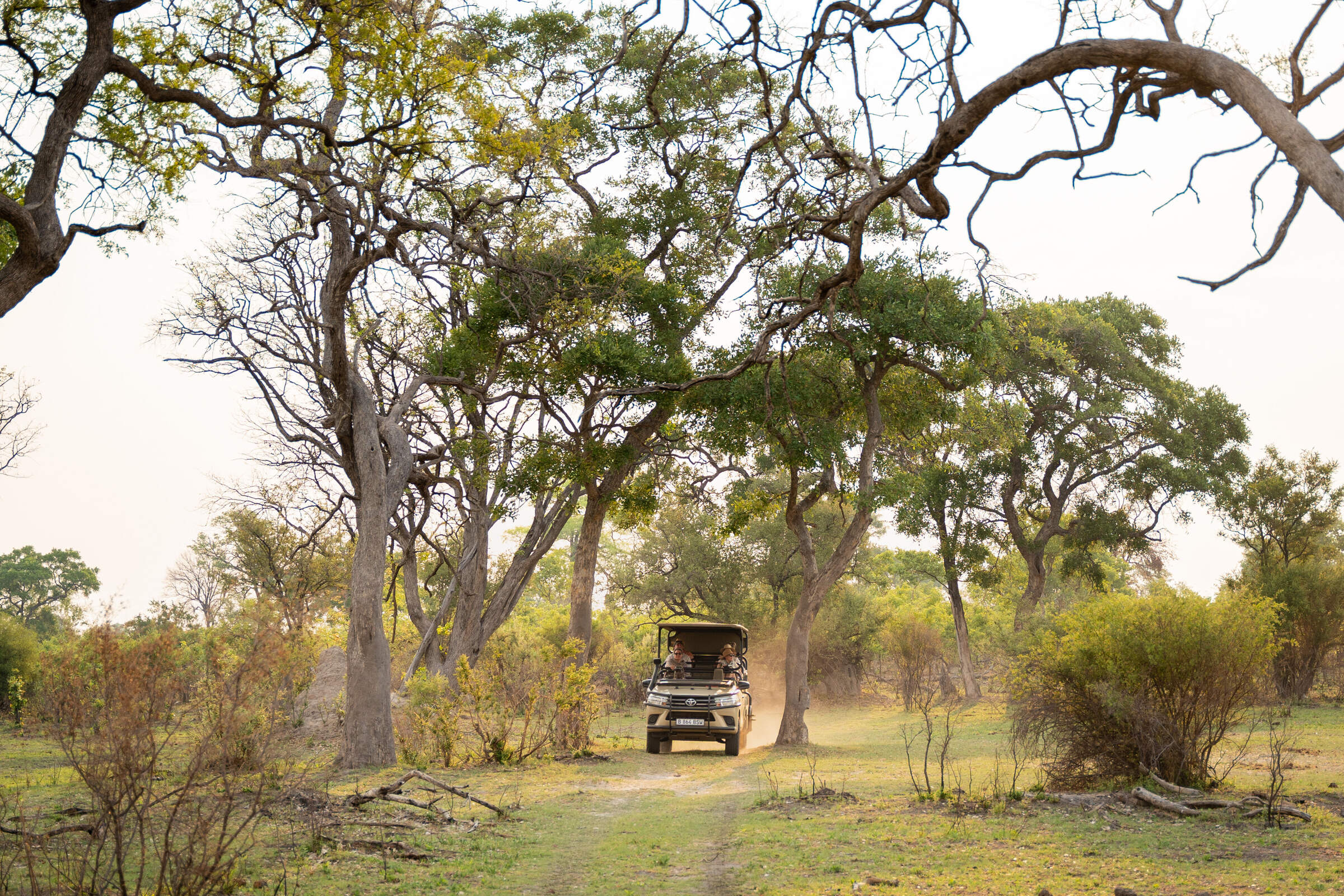
Karangoma
New for 2024, Karangoma is a classic, tented camp offering walking, canoeing and game drives, in partnership with the local Bukakwe San clan.
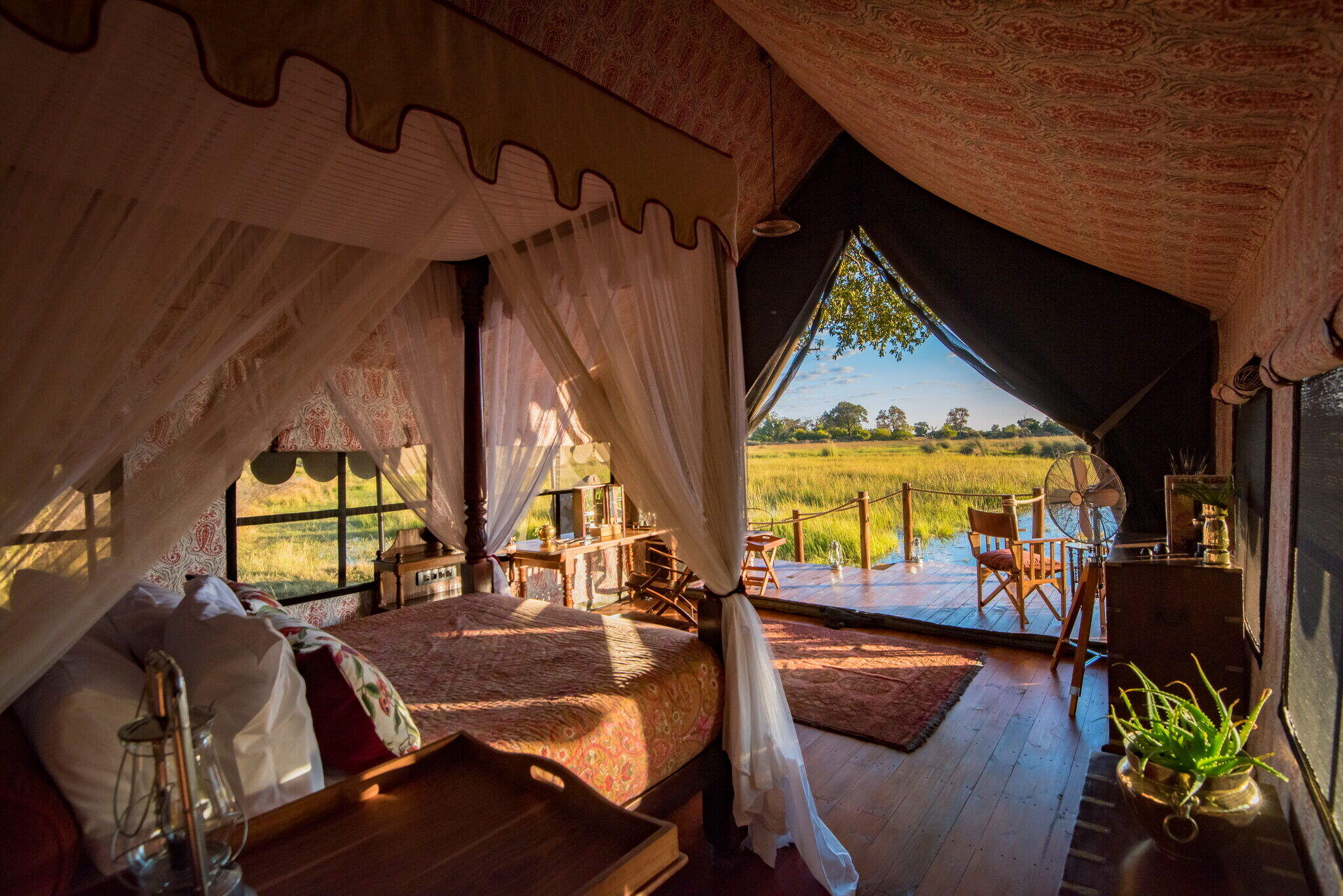
Duke’s Camp
On a remote island within a large concession, the romantic Duke's Camp and smaller Duke’s East are nestled among mature trees overlooking wildlife-rich plains and waterways of the Okavango.
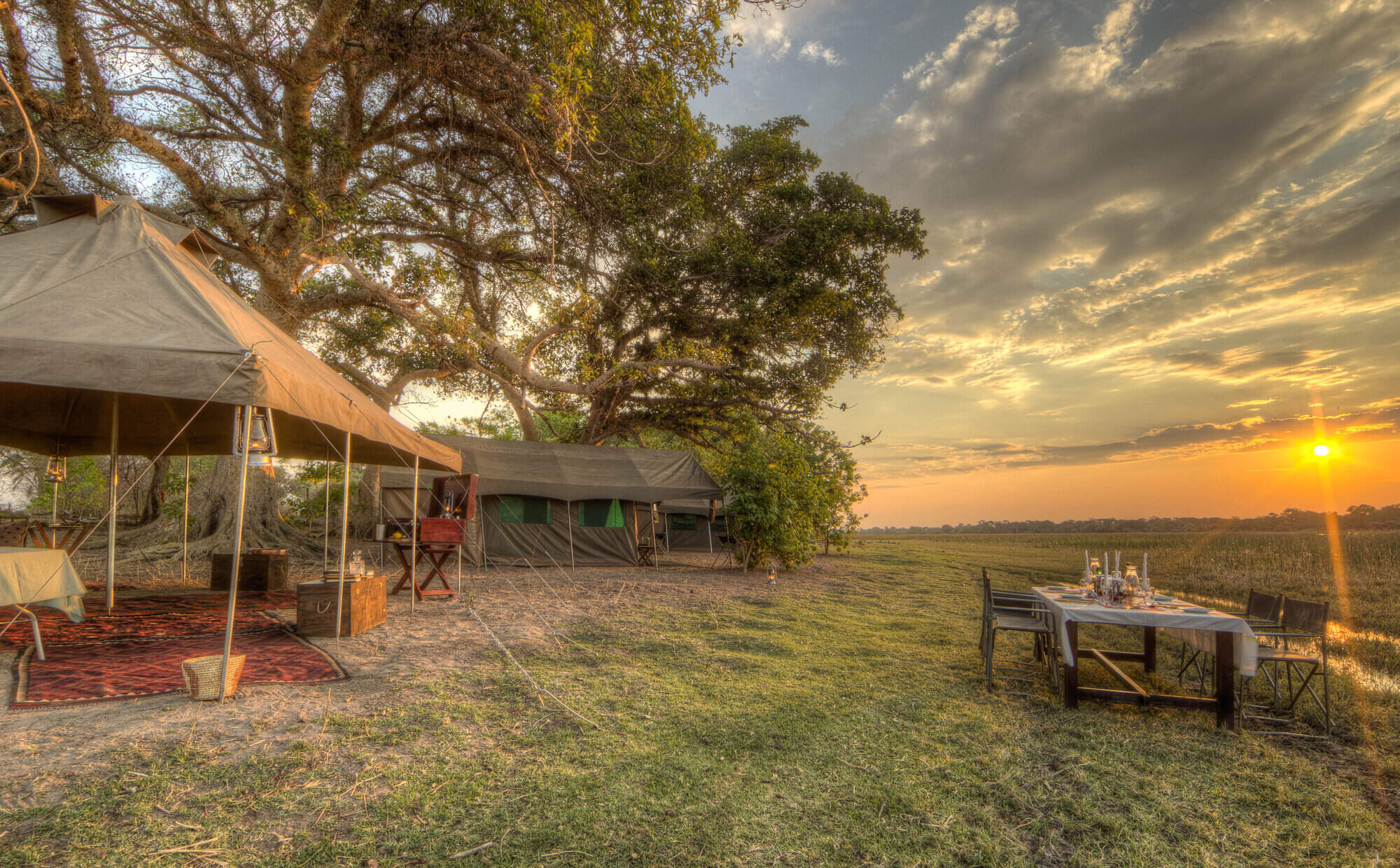
Okavango Walking Safari
The Okavango Delta Walking Safari camps in a secluded Okavango Delta Reserve where there are few roads; the ideal location for a walking trail led by an expert guide.
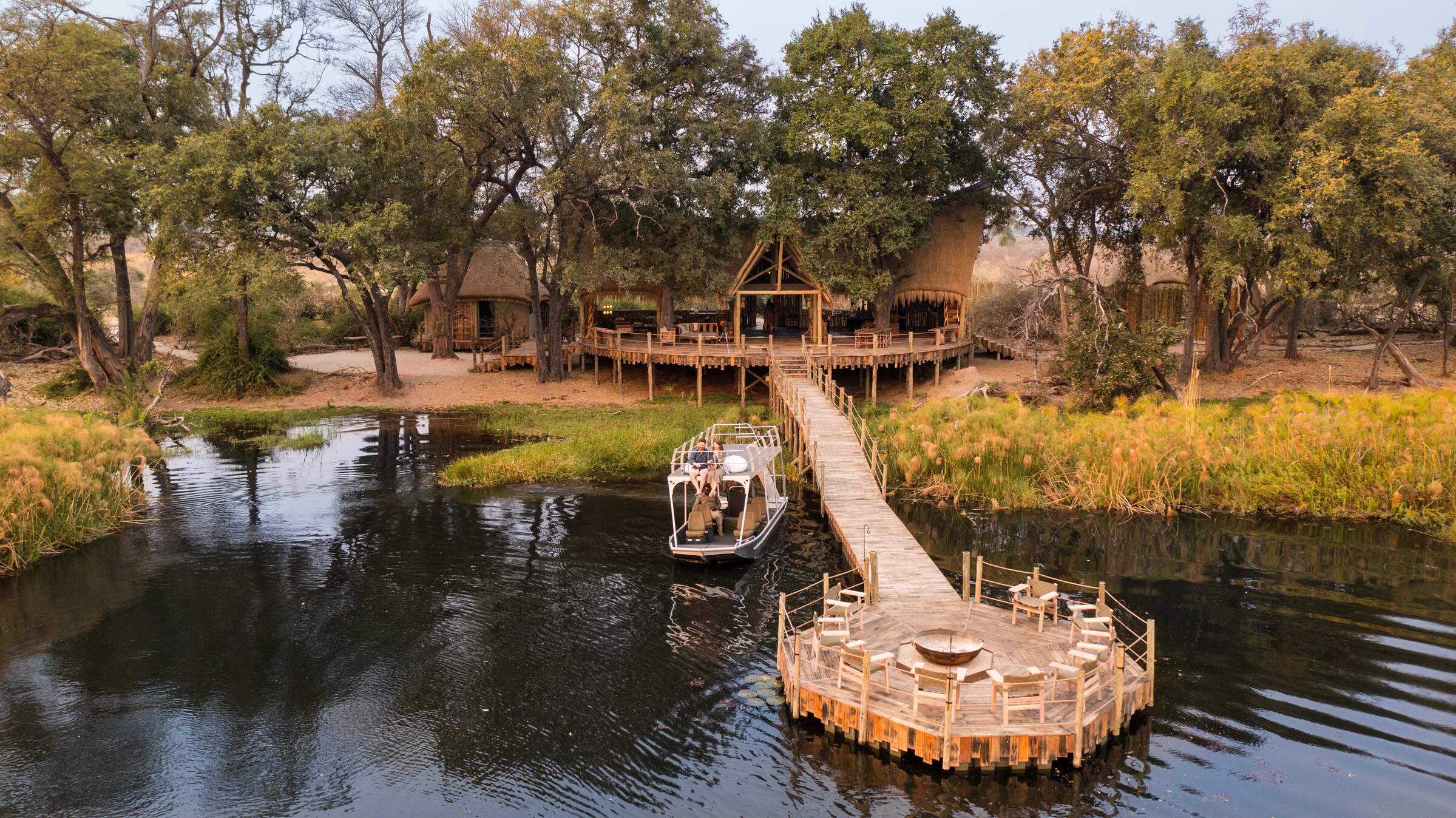
Sitatunga Island Camp
Tucked away in a pristine corner of the Okavango Delta, the exclusive Sitatunga Private Island is a water-based camp offering boating, mokoro trips and fishing.
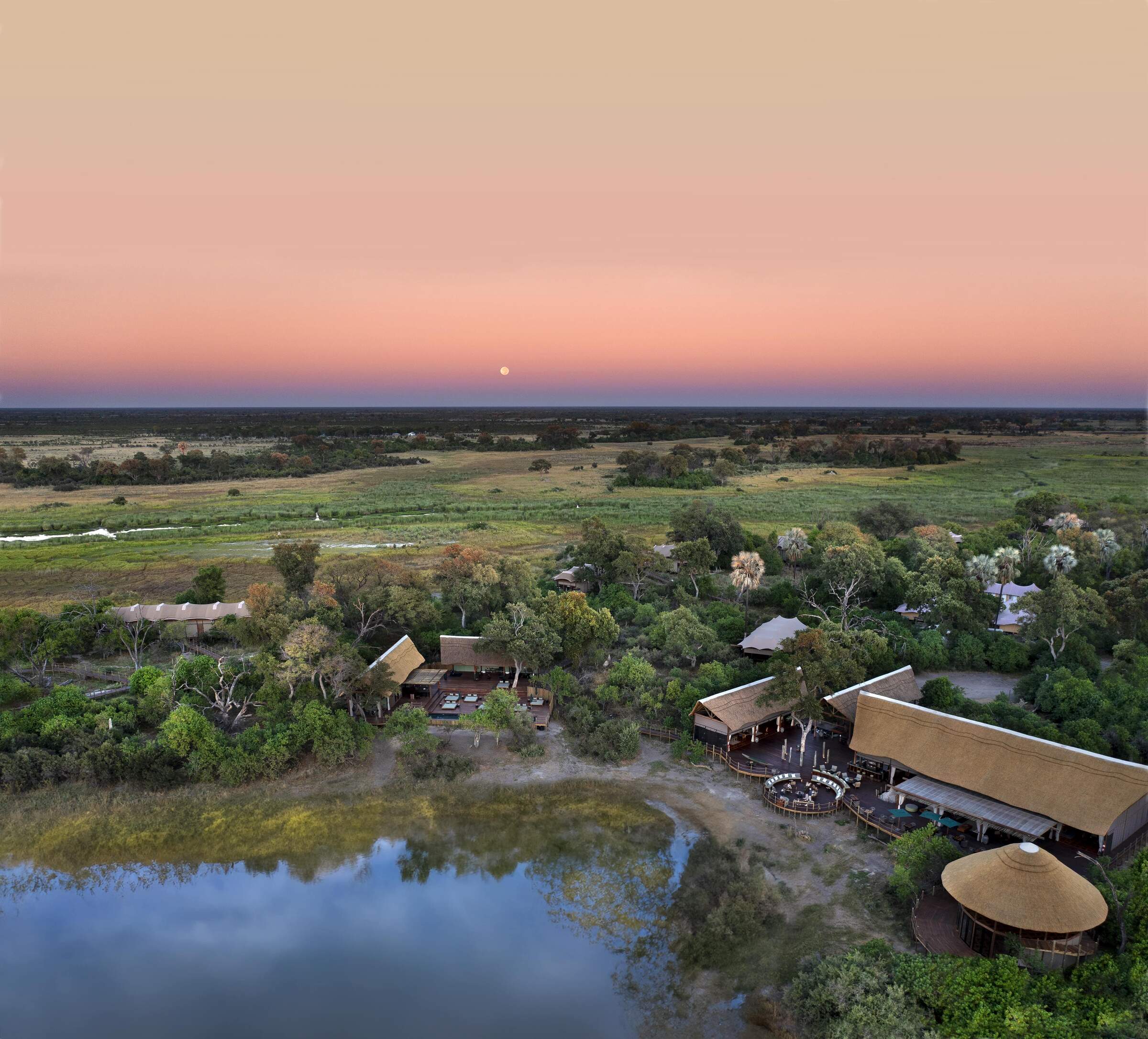
Atzaro Okavango
With a high level of tasteful luxury promised at Atzaro, we think it will be best suited to travellers seeking a touch of pampering alongside their safari.
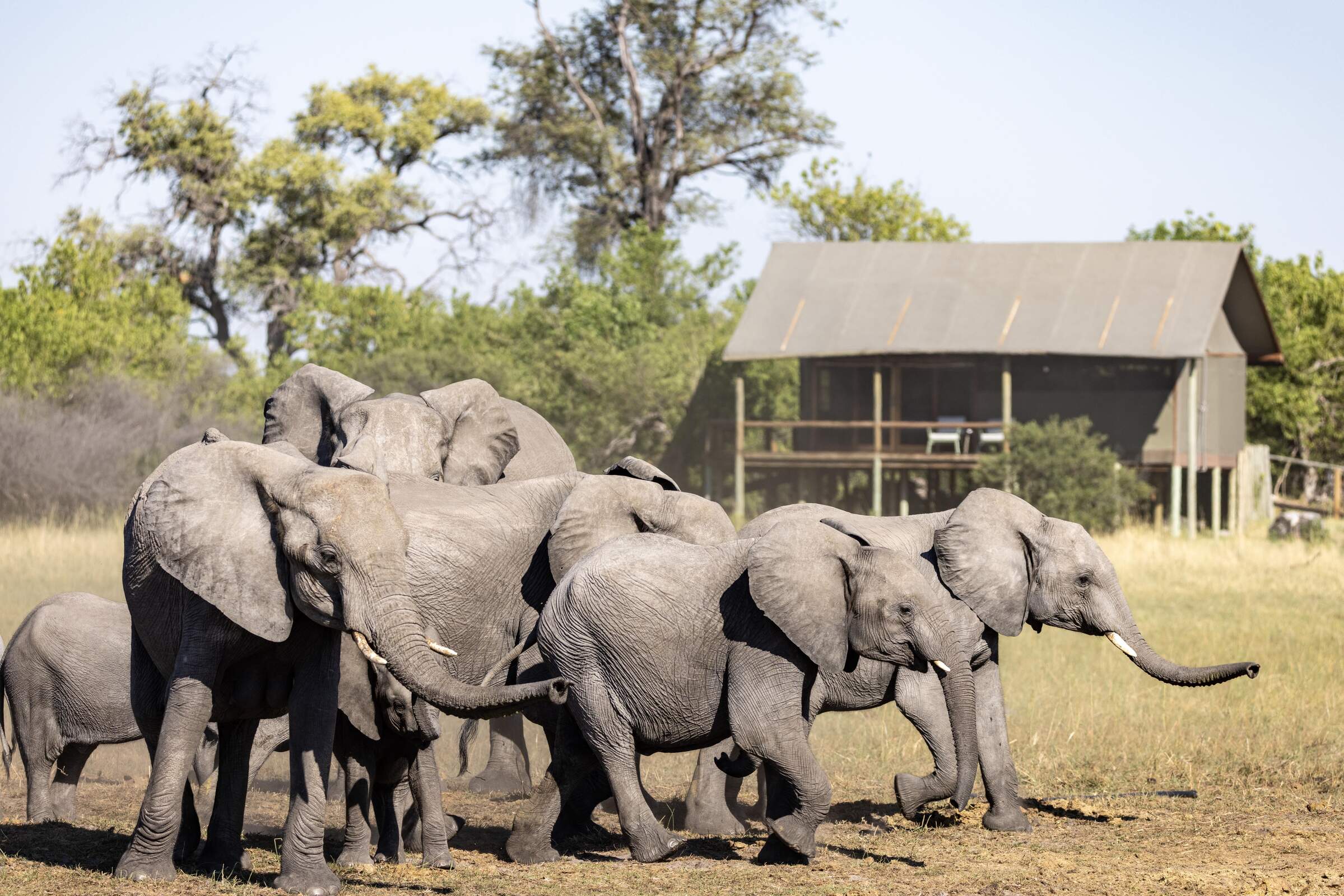
Mokolwane
Deep in the heart of the Okavango, the simple Mokolwane focuses on wildlife viewing in a large, untouched area.
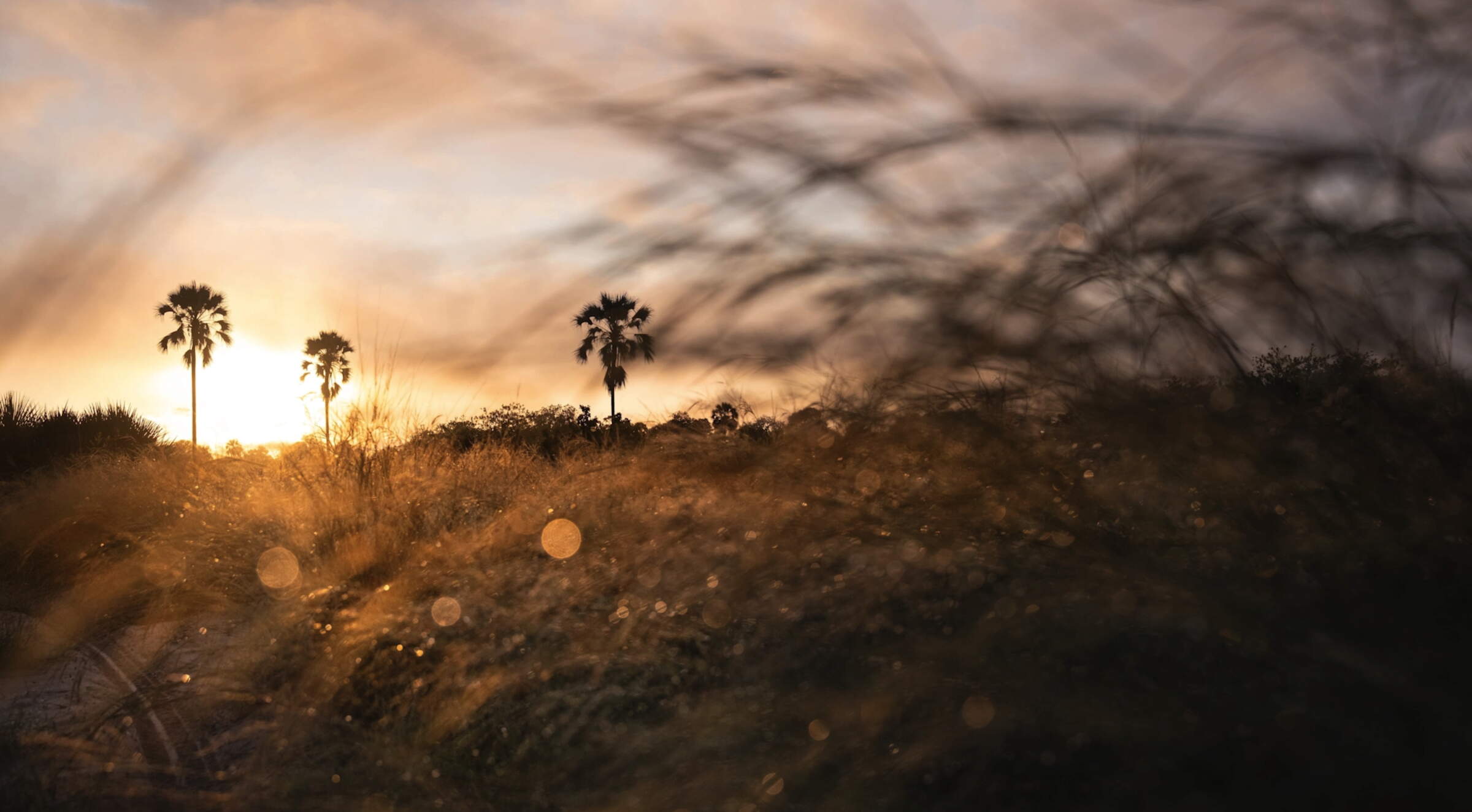
Singita Elela
Singita Elela is an exclusive safari camp on the western side of the Botswana's Okavango Delta - offering superb wildlife and water based opportunities depending on the seasonality.
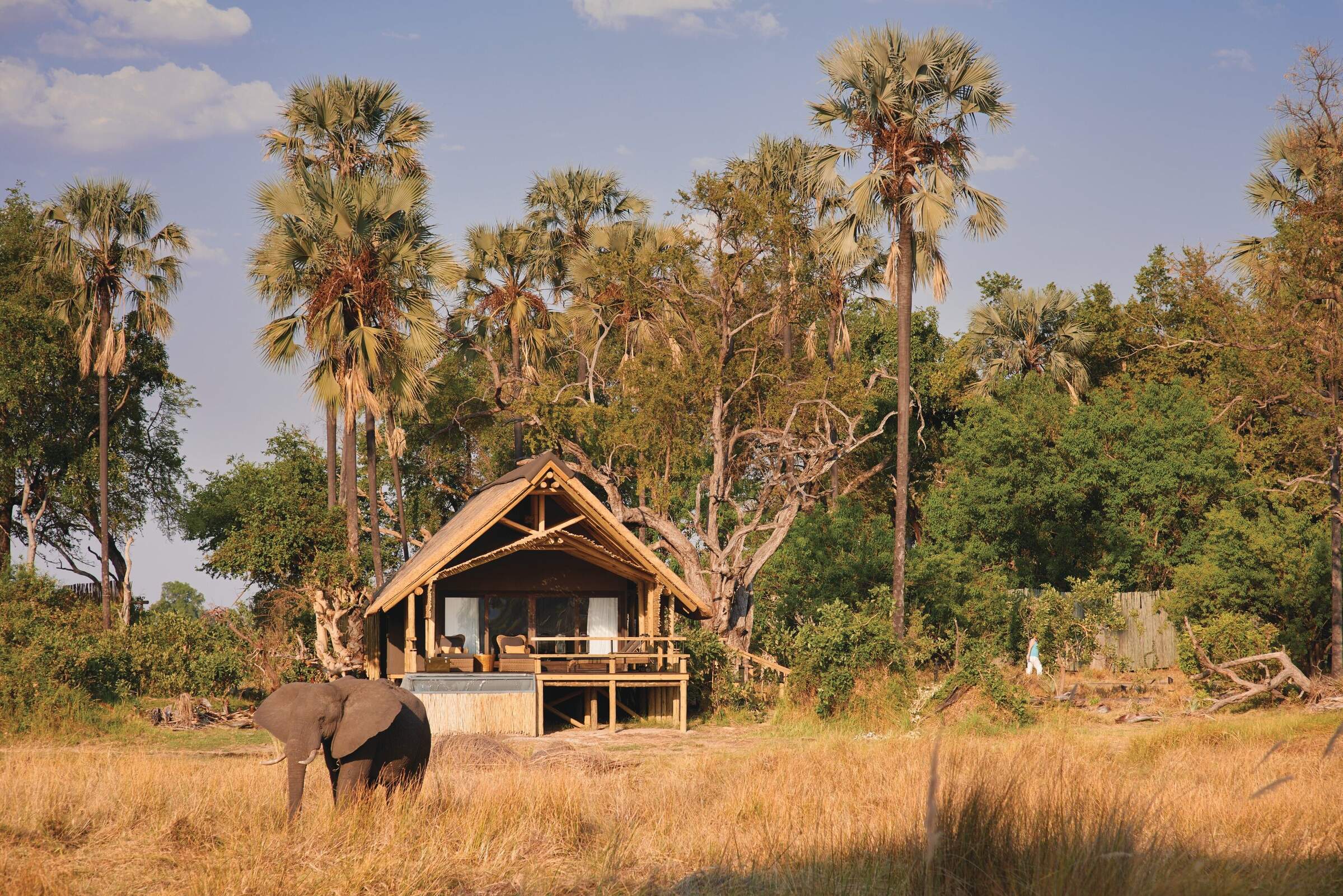
Eagle Island Lodge
Eagle Island Lodge is a luxurious camp with international-style facilities including air conditioning and intercom in each room; offering water based activities in the Okavango Delta.
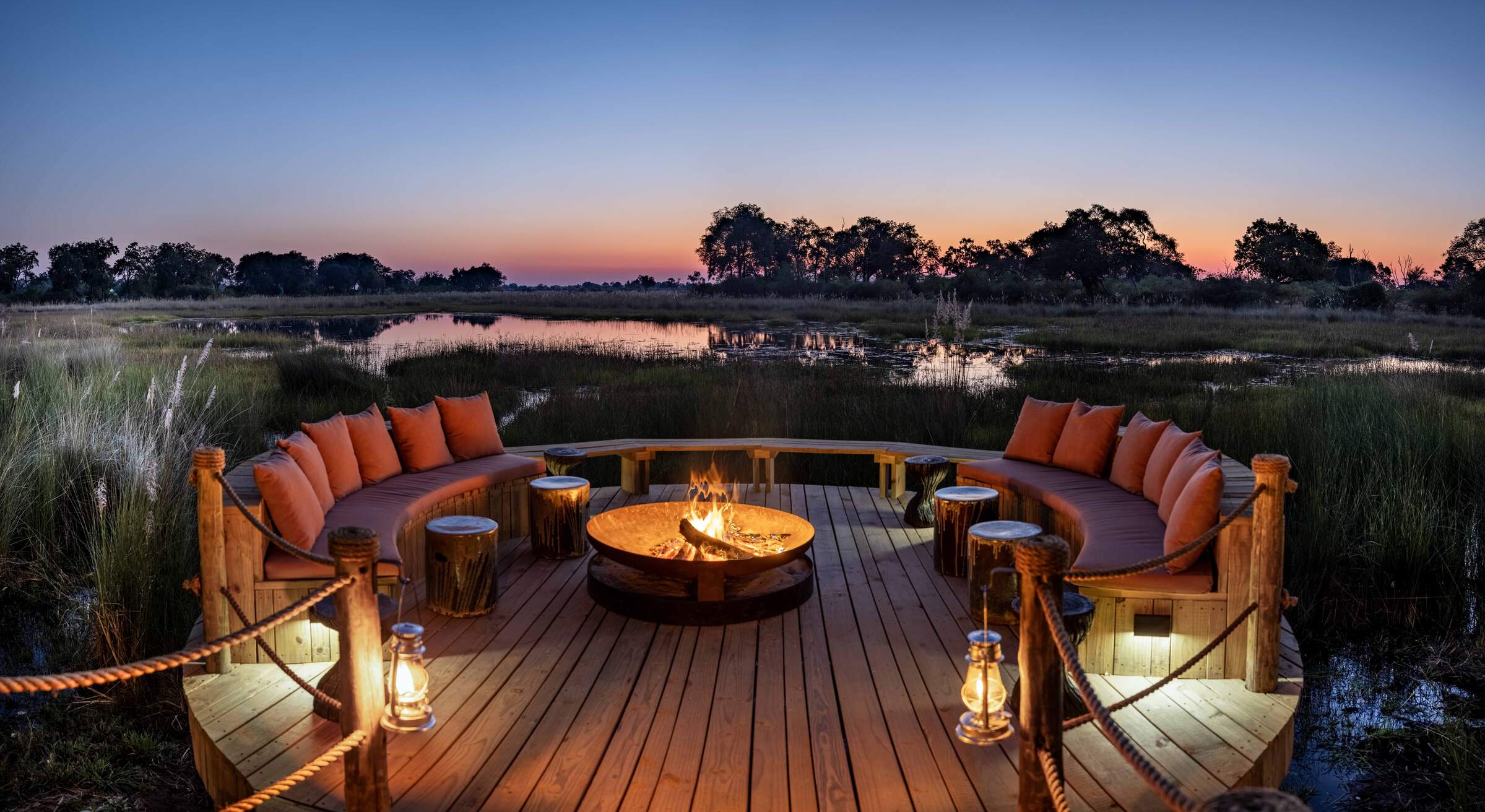
North Island Okavango
Deep in quintessentially “Okavango” territory, between deep-water and dry-land habitats, North Island focuses on a luxury safari experience with very good wildlife viewing opportunities.
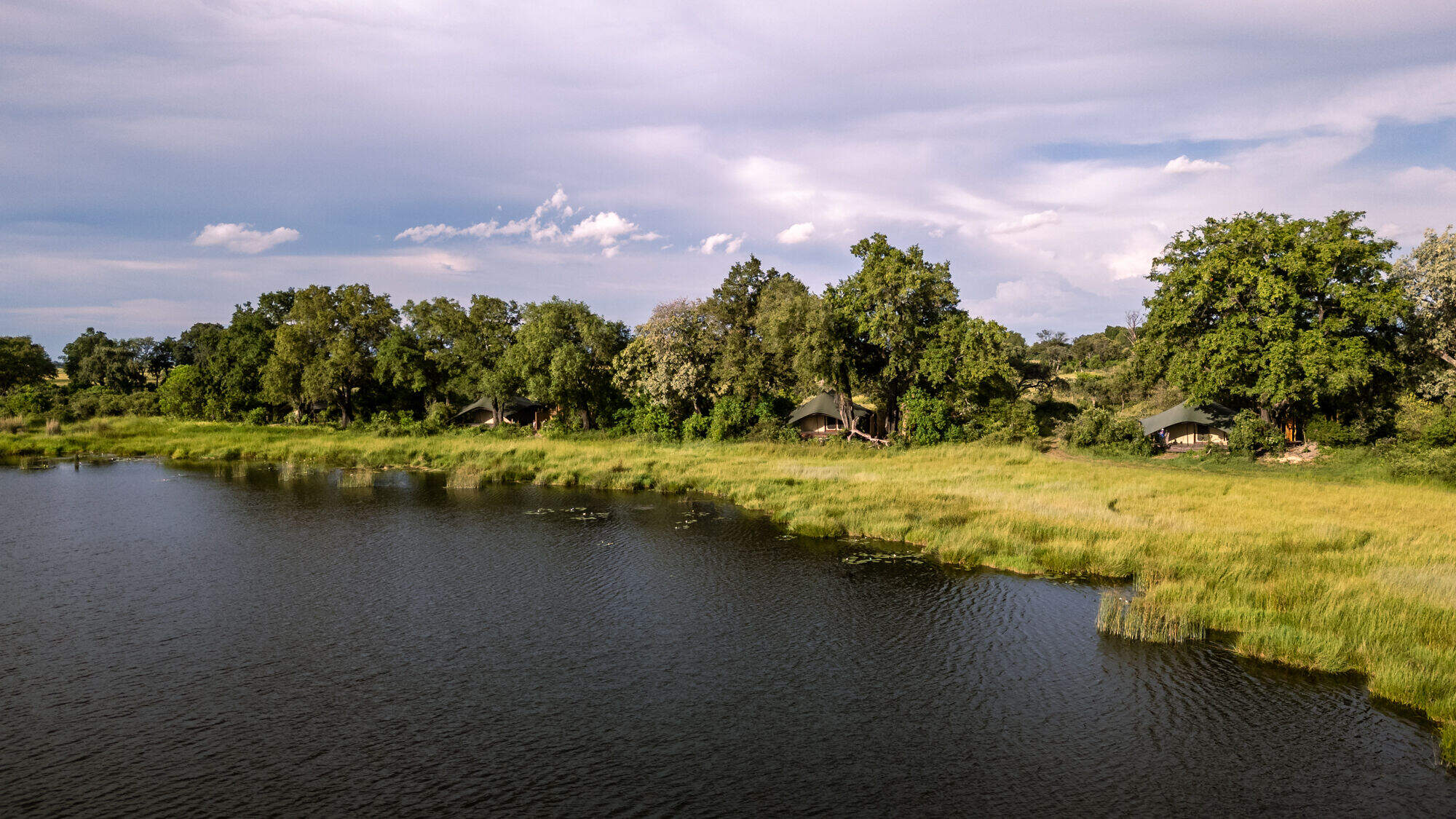
Maxa
Overlooking the permanent Maxa Lagoon, Maxa has a range of activities on offer, combining understated luxury with comfort in a remote location.
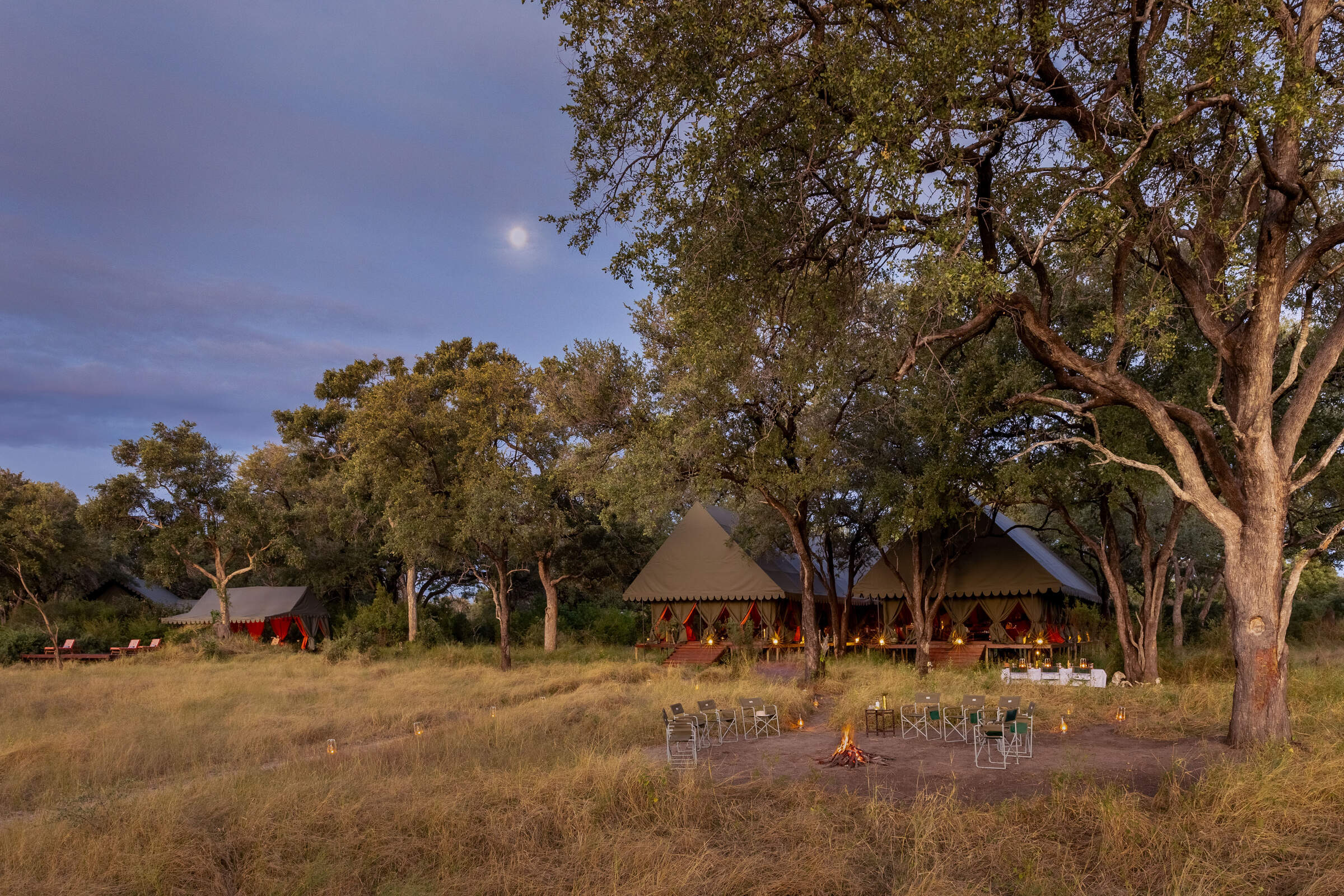
Mbamba
Deep within the northern Okavango, the classically styled Mbamba is located in the same wildlife-rich private concession as its sister camp Dukes.
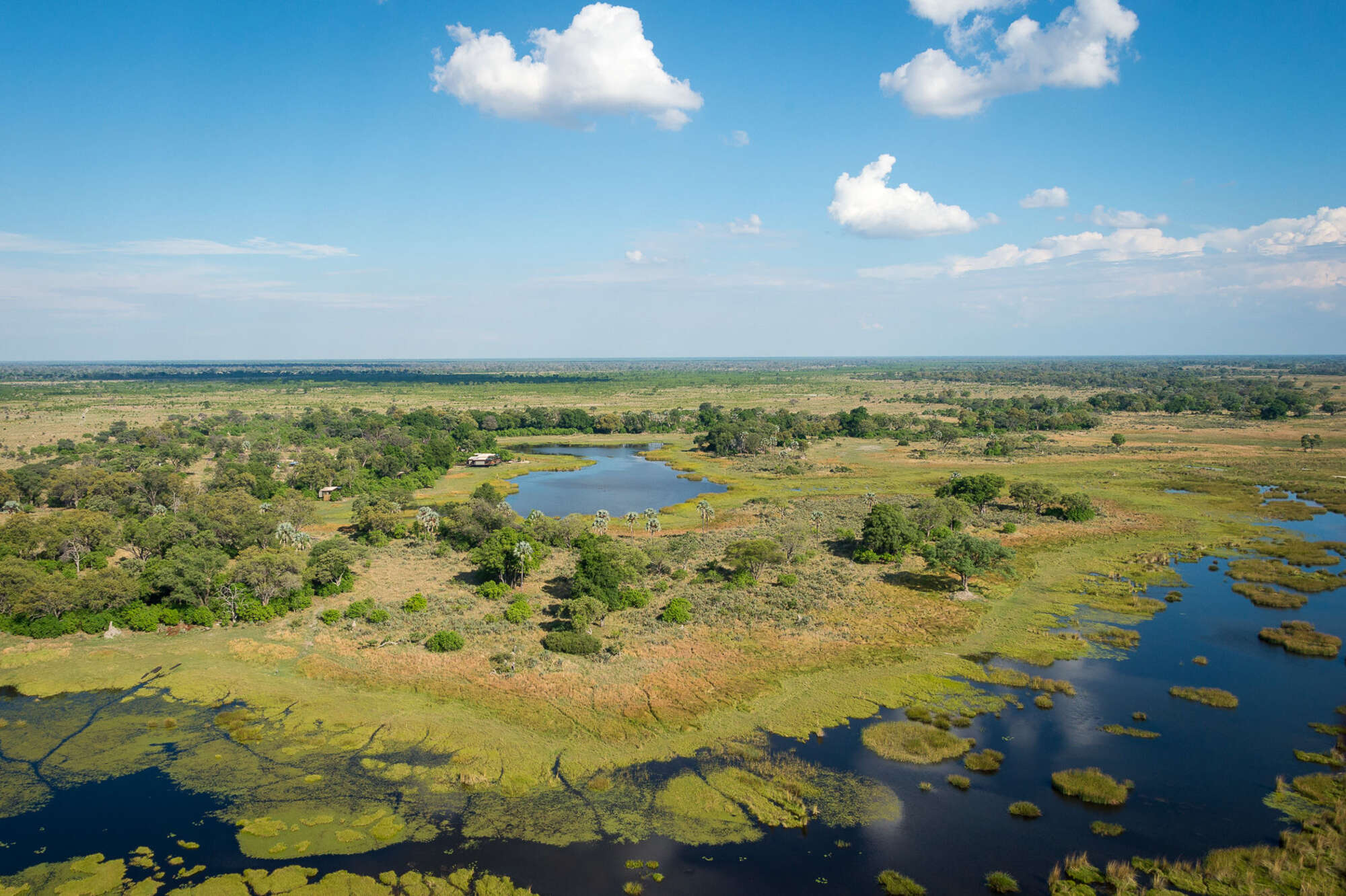
Qorokwe Camp
Luxurious and contemporary, the relatively new Qorokwe Camp is a gem in the Okavango Delta, offering land- and occasionally water-based activities in a prime wildlife area.
When to go to Okavango Delta Safari Reserves
Our month by month guide: What it's like to visit Mapula Lodge in Okavango Delta Safari Reserves
Jan
Feb
Mar
Apr
May
Jun
Jul
Aug
Sep
Oct
Nov
Dec
Okavango Delta Safari Reserves in January
January marks the peak of the rainy season in the Okavango Delta. Evening rains are often short but heavy, accompanied by occasional dramatic thunderstorms. Temperatures remain high, although cooler than the preceding months of October to December. Wildlife can be harder to spot as animals spread out across the lush floodplains.
This month is a birdwatcher’s paradise, with migratory species in abundance over flooded areas. Rising water levels in parts of the Delta make mokoro safaris possible, offering serene and immersive experiences. The vibrant greenery and dramatic skies provide stunning opportunities for photography. With relatively low rates and fewer visitors, January is ideal for those seeking a quieter, budget-conscious Botswana safari.
- Warm temperatures with frequent evening showers
- Birdlife at its most spectacular in the Delta
- Wildlife dispersed, but insects and smaller creatures abound
- Excellent availability in Delta lodges and camps
Our view
A good time to visit, with pros & cons
Weather in January
Okavango Delta Safari Reserves in February
February mirrors January’s weather patterns, with heavy rains and slightly cooler temperatures. The Delta’s landscape is at its greenest and teeming with life. Smaller animals, insects, and vibrant birdlife dominate, as many species raise their young. The rains create temporary pools and waterholes, further dispersing larger game, while thick vegetation and tall grass adds to the challenge of spotting big wildlife.
However, Moremi Game Reserve and select areas of the Delta still offer excellent game viewing opportunities. Rising water levels enhance water activities, with boat safaris providing unique access to the Delta’s watery beauty. February is particularly rewarding for photographers seeking lush landscapes and dramatic skies and birdwatchers, with many migratory species present.
- Warm with occasional thunderstorms
- Many animals with young in the Delta
- Big game dispersed throughout wetlands
- Big game dispersed, but viewing improves in drier areas
- Lower visitor numbers and great lodge availability
Our view
This is not a great time to visit
Weather in February
Okavango Delta Safari Reserves in March
March marks the gradual end of the main rainy season in the Okavango Delta. Sunny days become more frequent, with occasional afternoon thunderstorms. The Delta remains lush and vibrant, with wildlife activity increasing as animals finish raising their young and begin congregating around permanent water sources.
Rising water levels make boat safaris a highlight, offering intimate access to the Delta’s waterways. Birdwatching is excellent, with both resident and migratory species thriving. With fewer visitors, March offers a quieter, more personal safari experience.
- Rains taper off but temperatures remain warm
- Occasional small thunderstorms in Delta
- Wildlife begins congregating around water sources
- Ideal conditions for boat safaris
- Few tourists and attractive rates at camps
Our view
A good time to visit, with pros & cons
Weather in March
Okavango Delta Safari Reserves in April
April brings clearer skies to the Okavango Delta, with the landscape remaining green and lush. Night temperatures begin to drop, especially in the southern Delta. The annual floods from Angola start to flow through the northern Delta, filling channels and lagoons, creating ideal conditions for water-based activities like boat safaris.
Wildlife viewing improves as vegetation thins and predator activity increases with cooler evenings. Moremi Game Reserve and the private concessions offer rewarding game drives, and walking safaris on the larger islands, such as Chief’s Island, become popular during this time. Birdwatching remains excellent, with many migratory species still present. April’s combination of pleasant weather, wildlife activity, and relatively low rates makes it a rewarding time to visit.
- Cooler evenings and occasional light showers
- Floodwaters begin to fill Delta channels
- Predator-prey interactions increase
- Ideal for walking safaris and boat trips
- Popular shoulder season, rates fairly low
Our view
A good time to visit, with pros & cons
Weather in April
Okavango Delta Safari Reserves in May
May is a popular time to visit the Okavango Delta, marking the last month of the shoulder season. The annual floods continue to spread through the Delta, transforming the landscape. Cooler mornings and evenings encourage predator activity, while thinning vegetation makes wildlife spotting easier, though some tall grasses may still obstruct views.
May offers excellent photographic opportunities with clear, crisp air. It's a favourite time for many visitors, combining good wildlife sightings with pleasant weather. Camp bookings throughout the Delta fill up quickly during this period.
This is a perfect month for scenic flights, offering breathtaking views of the advancing floodwaters. Mokoro trips through the Delta’s tranquil waterways provide a unique perspective on the environment. Camps start to fill quickly as the Delta’s combination of pleasant weather and excellent wildlife sightings makes it a favourite among safari-goers.
- Cool mornings and evenings with little rain
- Improved game viewing as Delta grasses thin
- Predator activity increasing in drier areas
- Scenic flights and water activities highly recommended
- Last month of shoulder season for camps
Our view
A very good time to visit
Weather in May
Okavango Delta Safari Reserves in June
June signals the start of the dry season in the Okavango Delta. Days are warm, with clear skies, while mornings and evenings can be cold, occasionally reaching freezing temperatures. The annual floods reach their peak, creating spectacular conditions for water-based activities like boat safaris along the Khwai River and in private concessions.
Wildlife concentrates around permanent water sources as surface water dries up, improving game viewing. The thinning vegetation and crisp, clear air make June perfect for photography. High demand for camp bookings reflects its popularity, as this month combines great game viewing and pleasant weather.
- Warm days, cold mornings and nights
- Peak floodwaters make boat safaris unforgettable
- Wildlife congregates around permanent water sources
- Excellent conditions for photography
- High demand for camps and lodges
Our view
Fantastic: the very best time to visit
Weather in June
Okavango Delta Safari Reserves in July
July offers cool mornings and evenings with warm, sunny days, making it ideal for wildlife viewing. The floodwaters remain at their peak, providing excellent opportunities for boat safaris. Vegetation continues to thin, enhancing visibility on game drives in Moremi Game Reserve and the Okavango’s private reserves.
Large herds of elephants and buffalo are common sights as they gather near water sources. Predator sightings, including lions and leopards, increase as prey concentrates. Birdwatching is rewarding, and the crisp winter air creates stunning photographic conditions. July is one of the most popular months to visit, with many lodges fully booked well in advance.
- Comfortable days, cold mornings and nights
- Excellent game viewing and predator activity
- Moremi and Khwai areas become busy
- Private concessions offer exclusivity
- High season rates; advance bookings essential
Our view
Fantastic: the very best time to visit
Weather in July
Okavango Delta Safari Reserves in August
August remains a highly sought-after month for visiting the Okavango Delta. Nights are cool, while daytime temperatures rise gradually. Wildlife viewing is exceptional as animals concentrate near water sources, while the Delta’s floods are typically at their peak, offering picturesque settings for excellent boat safaris.
Walking safaris and game drives in areas like Moremi Game Reserve and Chief’s Island are particularly rewarding. Large herds of elephants and buffalo are common sights, and predator activity is high, with increased chances of seeing lions, leopards, and wild dogs hunting. The clear skies and lack of humidity create excellent stargazing conditions. With many travellers visiting during European and North American holidays, lodge availability can be challenging.
- Dry, warm days and cool nights in the Delta
- Fantastic wildlife viewing near water sources
- Excellent opportunities for game drives and boat safaris
- Cloudless skies, spectacular stargazing
- High demand for accommodation – book early
Our view
Fantastic: the very best time to visit
Weather in August
Okavango Delta Safari Reserves in September
September is a favourite for many safari-goers in the Okavango Delta. Daytime temperatures rise, but nights remain cool. The landscape transforms as greenery fades, and hazy conditions create dramatic sunsets. Wildlife viewing peaks as animals cluster around permanent water sources, with especially large numbers of elephants and buffalo. This concentration of prey attracts predators, increasing chances of witnessing exciting hunts.
The return of migratory birds enhances birdwatching. Water levels begin to recede, but boat cruises are still possible. Dusty conditions may challenge photographers, but the stunning landscapes and wildlife action more than make up for it.
- Warm days, cool nights in the Delta
- Prime month for Okavango wildlife viewing
- Migratory birds return, enriching birdwatching
- Spectacular sunsets and dramatic scenery
- High season rates, many Delta camps full
Our view
Fantastic: the very best time to visit
Weather in September
Okavango Delta Safari Reserves in October
October is the hottest and driest month in the Okavango Delta. Wildlife concentrates around the last remaining water sources, creating some of the most dramatic game viewing opportunities of the year. Predator-prey interactions are frequent and visibility is excellent, making for thrilling safaris.
Walking safaris are particularly rewarding, especially on smaller islands, but early starts are essential to avoid the midday heat. Towards the end of the month, the first rains may bring relief and begin rejuvenating the parched landscape. Despite the heat, October offers excellent big-game viewing and dramatic photographic moments of animal interactions.
- Hot days, with late-month chances of rain
- Outstanding big-game viewing near water sources
- Water activities limited as floods recede
- Walking safaris provide unique experiences
- Final month of the peak safari season
Our view
Fantastic: the very best time to visit
Weather in October
Okavango Delta Safari Reserves in November
November marks the start of the green season in the Delta. Rising humidity and temperatures often lead to the first heavy rains; these are typically short, heavy showers in the late afternoon or night, creating spectacular scenes and bringing a flush of green to the parched landscape. Wildlife begins to disperse as waterholes refill, but game drives still offer rewarding sightings.
Water levels may be low, limiting boat activities, but November is exceptional for birdwatching, with the arrival of many migratory species. Scenic flights highlight the contrast between dry and wet areas. The first two weeks are popular for travellers seeking good game viewing at lower rates as the Delta transitions into its shoulder season.
- Hot, humid days in the Delta
- Dramatic rain showers , increasing as month progresses
- Migratory birds arrive in abundance
- Wildlife watching good, but less predictable
- Shoulder season offers mid-range rates
Our view
A good time to visit, with pros & cons
Weather in November
Okavango Delta Safari Reserves in December
December sees the rainy season in full swing across the Okavango Delta, bringing some respite from high temperatures. Game viewing becomes more challenging as wildlife disperses, but great sightings can still be had. The landscape transforms dramatically, with lush vegetation sprouting across the Delta. This period is excellent for birdwatching, with numerous migratory species present.
Water levels begin to rise, gradually improving conditions for boat safaris. The green season offers unique photographic opportunities, with dramatic skies and newborn animals. December is ideal for visitors seeking a more intimate Delta experience, with fewer tourists and lower rates at many camps and lodges. The combination of wildlife, birdlife, and scenic beauty makes it a rewarding time to visit.
- Warm temperatures
- High chance of rain in short, heavy storms
- Wildlife more dispersed across Delta
- Game viewing more challenging in wetlands
- Low-season rates and fewer visitors in most Delta camps
Our view
A good time to visit, with pros & cons
Weather in December

Looking for inspiration on where to travel next?
Visit our trip chooser to explore your options and find inspiration for your perfect African adventure
Inspire me